Iran Fires Missiles at Israel in Retaliation for Prior Strikes: Live Updates
Iranian missile barrages continued to target Israel in multiple waves early Saturday, triggering sirens across much of the country’s north. Damage to homes and more than a dozen casualties, including two deaths, were reported in central Israel by the country’s emergency services speaking on Israeli news channels. Earlier Friday night, explosions could be seen in Tel Aviv, amid a retaliatory attack Iranian officials dubbed “Operation Severe Punishment,” meant as a response to an Israeli strike against Iran’s nuclear program and military targets. The Israeli strikes killed at least 78 people, including four senior Iranian commanders.
4:09 PM: What to know about Iran’s attack on Israel, following earlier Israeli strike
- Iran launched hundreds of ballistic missiles toward Israel on Friday night in what it dubbed “Operation Severe Punishment.” Sirens rang out across Israel, and explosions could be seen in Tel Aviv.
- The Iranian attack was retaliation for an Israeli operation that killed three senior commanders and two nuclear scientists in Iran, according to the country’s semiofficial Tasnim News Agency. Multiple explosions were reported across Iran early Friday, including in Tehran and at the Natanz nuclear facility.
- In a televised address early Friday, Israeli Prime Minister Benjamin Netanyahu said the goal of Israel’s operation was “to damage Iran’s nuclear infrastructure, its ballistic missile factories and military capabilities.”
- Hours after Israel’s attack, Iran launched more than 100 drones , the Israel Defense Forces said. Israel began to intercept the drones outside Israeli territory, according to a military official.
- Leaders across the Middle East and Europe have called for de-escalation. U.N. Secretary General António Guterres called for both sides to show “ maximum restraint ,” his spokesperson said.
By: Victoria Craw and Mikhail Klimentov
12:11 AM: Analysis from Alon Rom
The initial casualty toll after Iran sent missile barrages toward Israel early Saturday, which caused damage to homes in Rishon LeZion in central Israel, is at least two dead, two seriously injured and 18 lightly injured, Israel’s emergency services head Eli Bin said on Israeli news channel N12.
11:09 PM: Analysis from Alon Rom
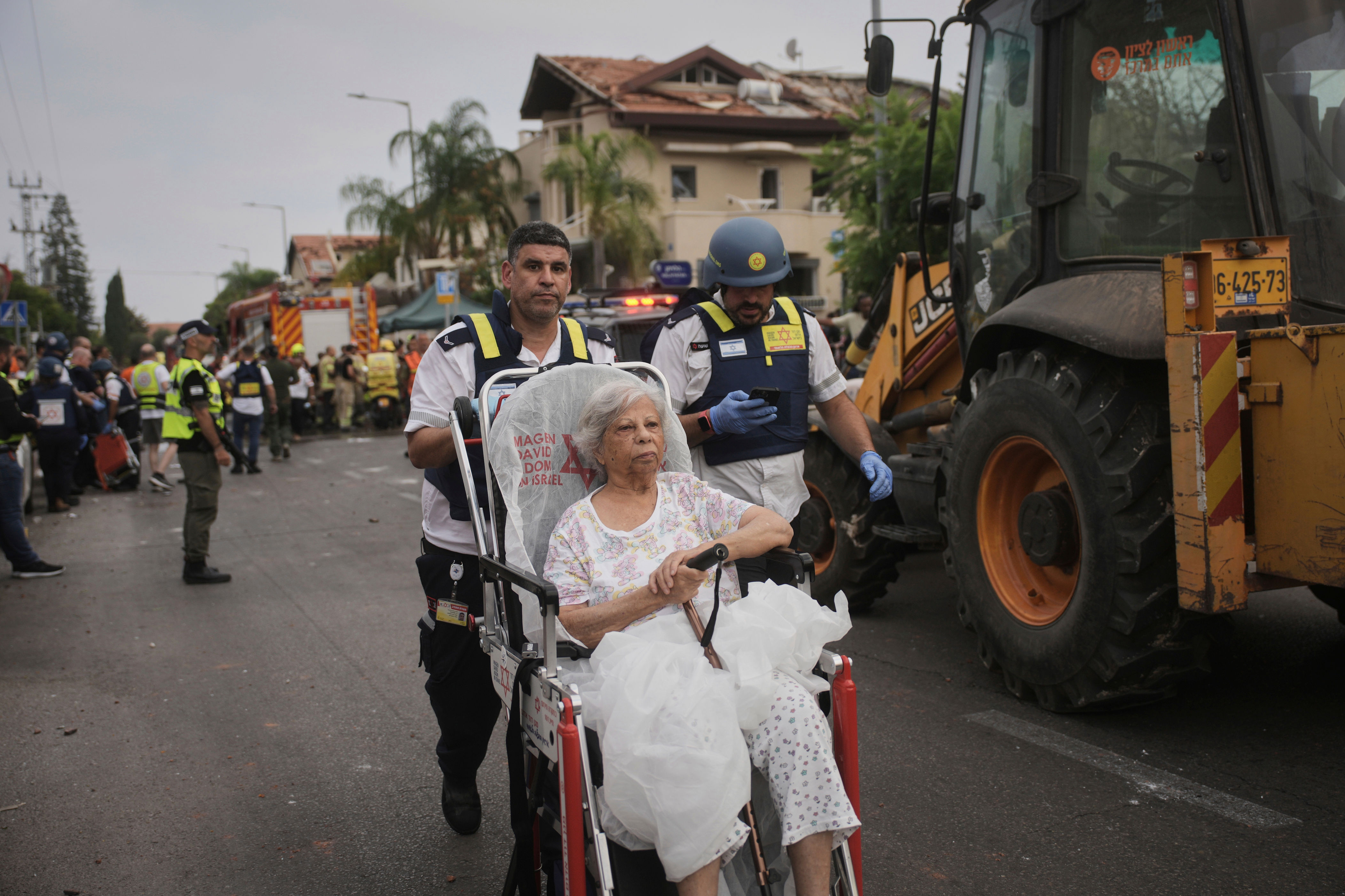
One person was killed and 14 wounded when four houses in Rishon LeZion in central Israel were struck in the early morning barrage, a spokesperson for Magen David Adom (MDA), Israel’s emergency services, said in a broadcast on Israeli news channel N12. MDA teams are continuing to search the area, it said in a social media post .
10:30 PM: Analysis from Frances Vinall
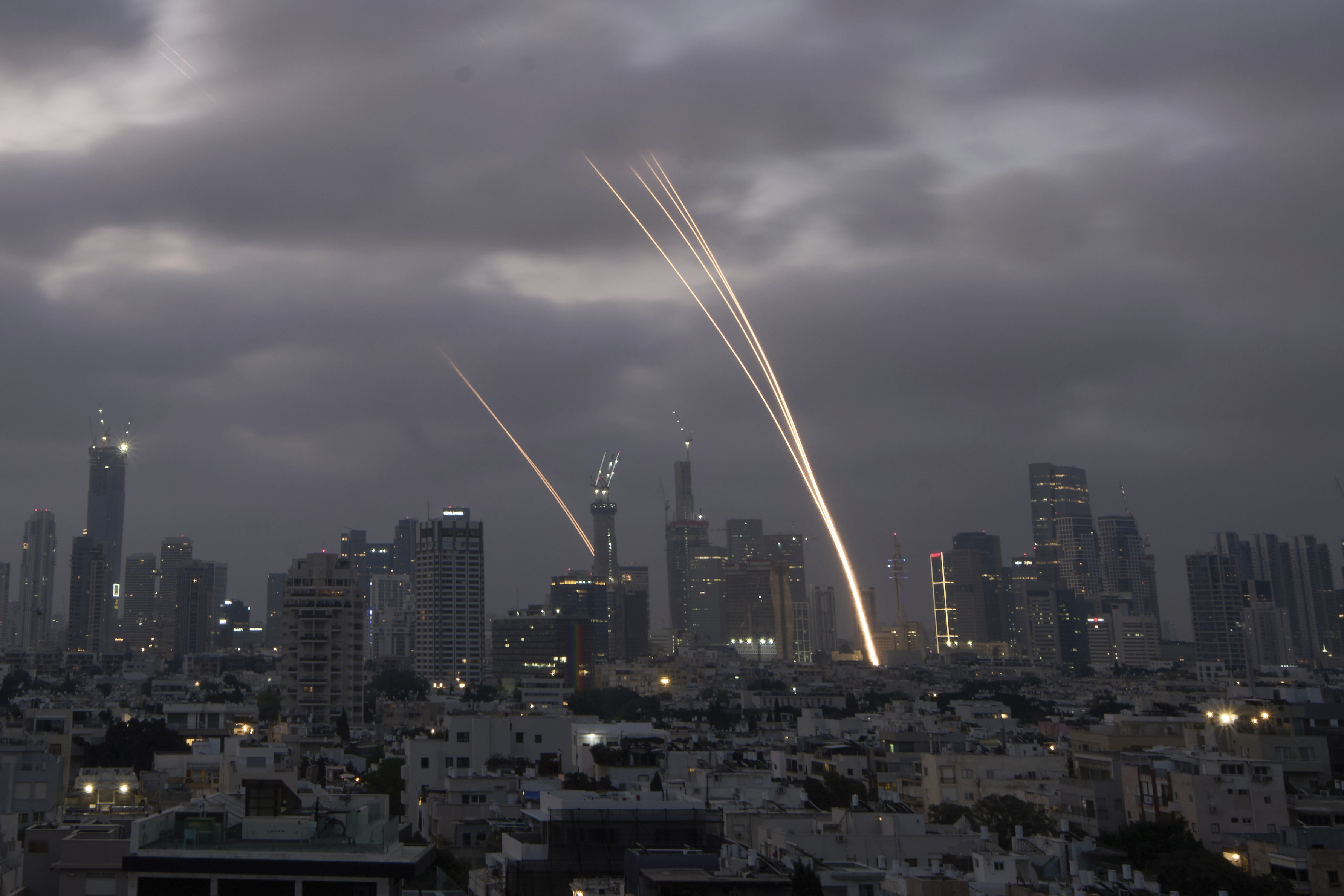
The Israel Defense Forces again identified missiles coming from Iran on Saturday morning, about 15 minutes after issuing the last all clear. Sirens sounded throughout the northern area of the country and along its southeast border.
10:02 PM: Analysis from Frances Vinall
Sirens sounded in several areas across northern Israel as Iran launched a fresh round of missiles early Saturday, the Israel Defense Forces said . Shortly afterward, it issued an all-clear to leave shelters but asked Israelis to remain near them.
9:44 PM: Analysis from Frances Vinall
Explosions were heard in two neighborhoods in eastern Tehran shortly after 4 a.m. local time, reported the country’s semiofficial Tasnim News Agency, which is linked to the Islamic Revolutionary Guard Corps. The agency shared video of smoke pouring from behind buildings.
8:29 PM: Analysis from Tobi Raji, General Assignment Reporter
Fire and massive plumes of smoke billowing into the night sky can be seen in photos of Mehrabad International Airport in Tehran, amid Iranian media reports of an explosion at an air base in the area.
8:05 PM: Analysis from Dan Lamothe, Covers the U.S. military and Pentagon
Patriot and THAAD missile defense batteries, operated by U.S. military personnel and originally deployed under the Biden administration, participated in Israeli air defense Friday evening, according to U.S. defense officials who spoke on the condition of anonymity to discuss the sensitive subject. That represented a more limited participation in Israel’s defense than last year, when American air and sea assets helped shoot down incoming Iranian missiles during two retaliatory Iranian attacks.
7:46 PM: Voice of America brings back 50 staffers amid Iran-Israel conflict

Voice of America told more than 50 employees to come back to work immediately Friday amid escalating military action between Iran and Israel. Employees told The Washington Post that most of the Persia team was restored to assist with the news out of the Middle East.
Read the full story
By: Scott Nover
7:22 PM: Analysis from Mikhail Klimentov
At least 78 people were killed and 320 injured in Israeli strikes across Iran early Friday, said Iran’s ambassador to the United Nations. It was not immediately clear how many were civilians, versus military personnel.
6:12 PM: Analysis from Mikhail Klimentov
Sirens sounded again in parts of Israel, with the Israeli military warning that another wave of missiles from Iran was inbound. Shortly after, Israeli officials gave civilians permission to leave their shelters.
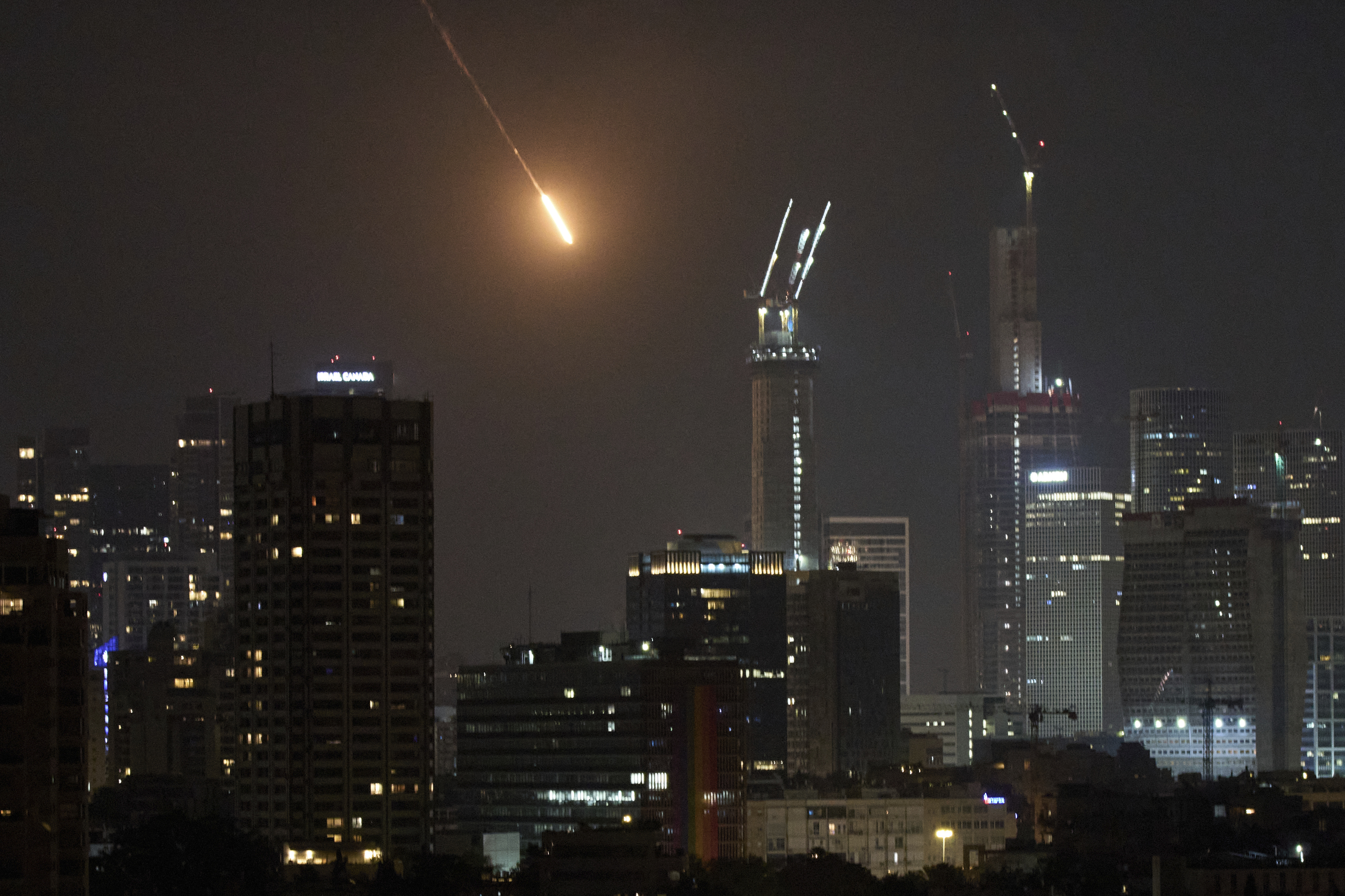
5:47 PM: Analysis from Claire Parker, Cairo bureau chief
Egypt’s petroleum and natural resources ministry activated an emergency plan Friday to secure natural gas supplies and keep the electricity grid of the largest Arab country online after Israel shut its biggest gas field, halting flows to Egypt and Jordan. The Israeli Energy Ministry cited security reasons for the move, Bloomberg reported. Egypt relies on natural gas imports from Israel, and demand for electricity spikes during the summer. Egypt’s measures include halting natural gas supplies to some industrial sites and upping power plants’ consumption of diesel to the maximum level, according to a statement from the ministry, which said the moves were precautionary.
5:42 PM: Analysis from Michael Birnbaum, White House correspondent covering the Trump presidency and foreign policy
President Donald Trump and Israeli Prime Minister Benjamin Netanyahu spoke by telephone on Friday, according to a U.S. official who did not elaborate on the discussion.
4:48 PM: Analysis from Joshua Yang
Israel’s attack on Iran struck the Fordow nuclear enrichment facility, Iranian authorities told Rafael Grossi, director general of the International Atomic Energy Agency. “At this moment, we do not have enough information beyond indicating that military activity has been taking place around these facilities,” Grossi reported in an emergency meeting of the United Nations Security Council.
Israel struck both of Iran’s known nuclear enrichment facilities, along with the Isfahan Nuclear Technology Center, a major research center. Fordow’s location deep beneath a mountain, however, could compromise Israel’s ability to successfully bomb the site.
4:43 PM: Multiple injuries in Israel after Iranian missile response
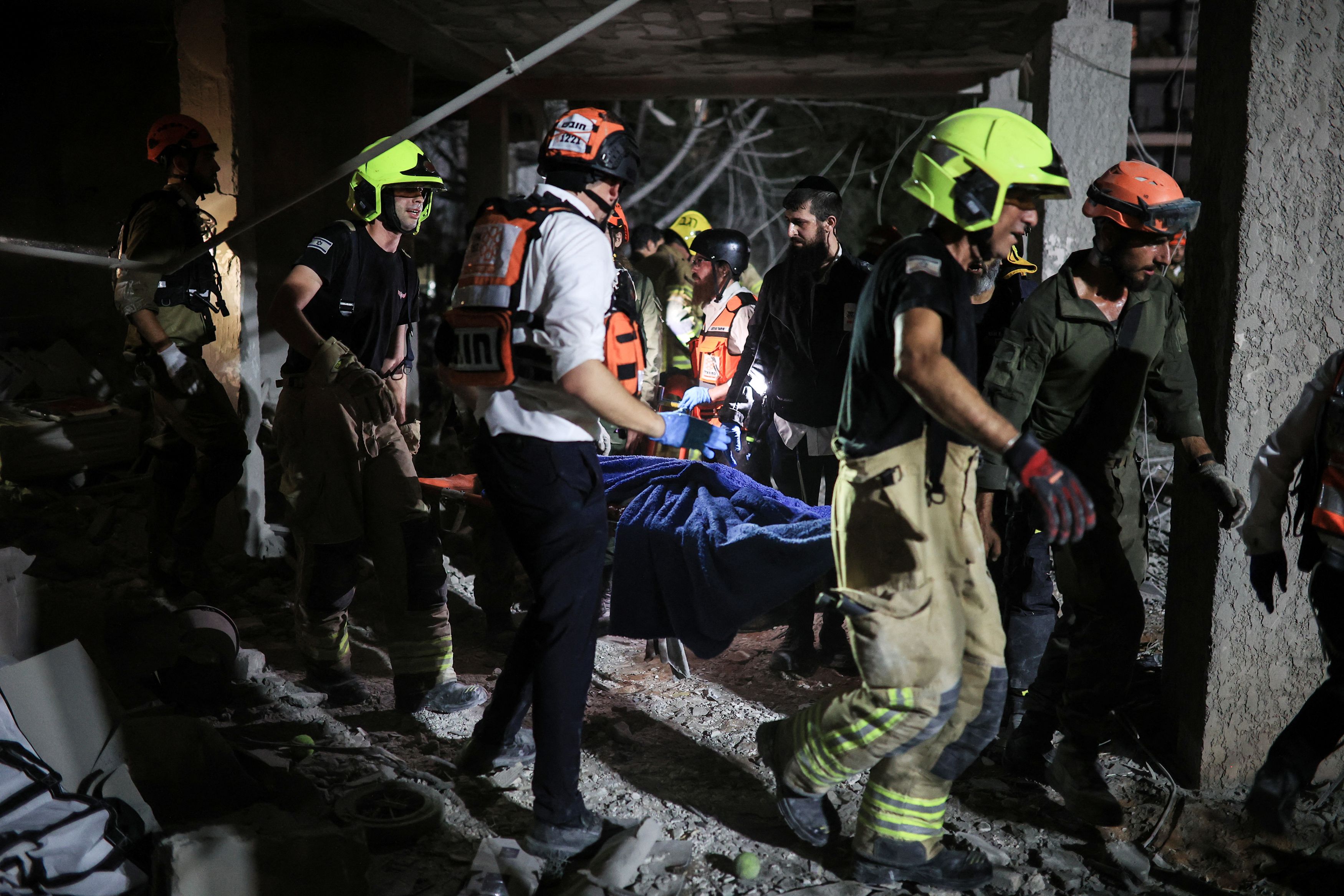
Dozens of people in Israel suffered injuries from shrapnel amid an Iranian missile barrage Friday night — the country’s response to Israeli strikes targeting Iranian nuclear facilities and military leadership earlier in the day.
So far, Iran has launched dozens of ballistic missiles toward Israel, according to an Israeli military official who spoke on the condition of anonymity to discuss the sensitive ongoing developments.
Magen David Adom (MDA), Israel’s national emergency service, said it treated seven people — two seriously wounded, one in moderate condition and four with light injuries — and transported them to Ichilov and Sheba Tel Hashomer hospitals’ trauma care unit. The two seriously wounded people, an elderly man and woman, had been trapped and suffered injuries to the upper and lower body, MDA said.
At Ichilov in Tel Aviv, a woman and her infant son were treated for smoke inhalation, according to a spokesperson for the medical facility. The medical center has received at least 18 injured people, most of who were in mild condition.
One woman was admitted to the trauma unit at Beilinson Hospital, where doctors were fighting to save her life, a spokesperson for the hospital said. Seven others were in “light condition.”
The Israel Fire and Rescue Authority said firefighters were responding to scenes mainly in the Dan region of central Israel. There, firefighters have worked to extinguish fires ignited by missiles and have responded to reports of individuals trapped in high-rise buildings.
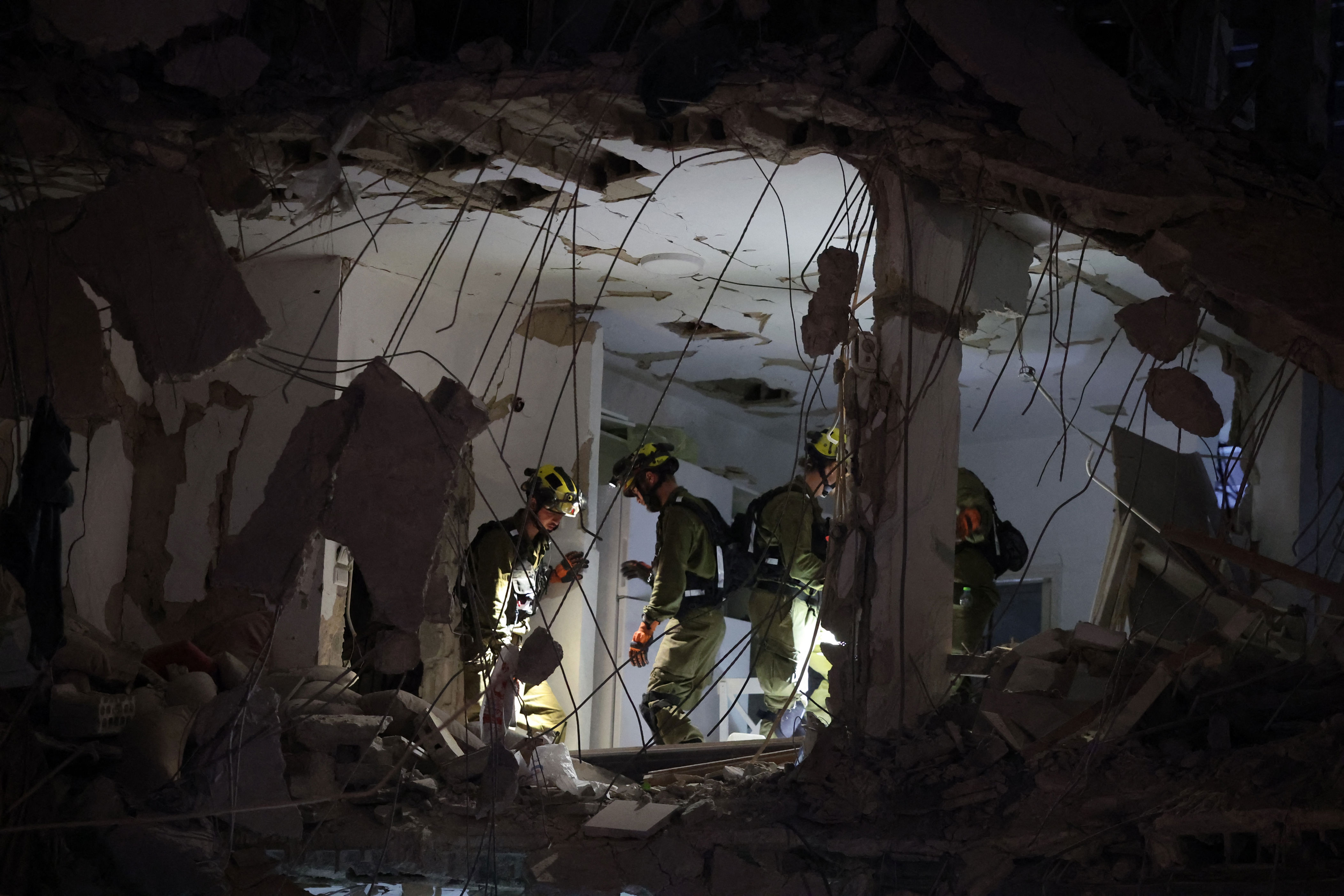
By: Angie Orellana Hernandez, Lior Soroka, Alon Rom and Shira Rubin
4:42 PM: Analysis from Alex Horton, National security reporter focused on the U.S. military. Send him secure tips on Signal at alexhorton.85
The U.S. military has helped Israel intercept incoming Iranian missiles, U.S. and defense officials told The Washington Post. The officials spoke on the condition of anonymity to discuss ongoing operations.
3:59 PM: Israeli families take shelter as nighttime explosions continue

TEL AVIV — Explosions reverberated across Israel’s skies Friday night as the country intercepted Iranian ballistic missiles, including several that fell near Israel’s main military compound in Tel Aviv and encircled its iconic tower with spiraling plumes of smoke, according to video circulated on social media. The strikes came in at least two waves and fell in at least seven sites in central Israel.
Emergency health services reported at least 21 people injured, suffering from shrapnel wounds and smoke inhalation. Many were admitted to makeshift underground hospital emergency areas.
“I’ve never been at this level of stress,” said a mother in a basement shelter in Tel Aviv, who cried as she held her sleeping week-old baby.
Across Israel, families feverishly checked in with each other over WhatsApp, sharing selfies in safe rooms and shelters, and photos of damage to buildings and streets. On a popular Tel Aviv Facebook group, a resident posted a safe room picture smiling next to Caitlyn Jenner, who was in Tel Aviv for the city’s Gay Pride Parade that was canceled due to the security situation.
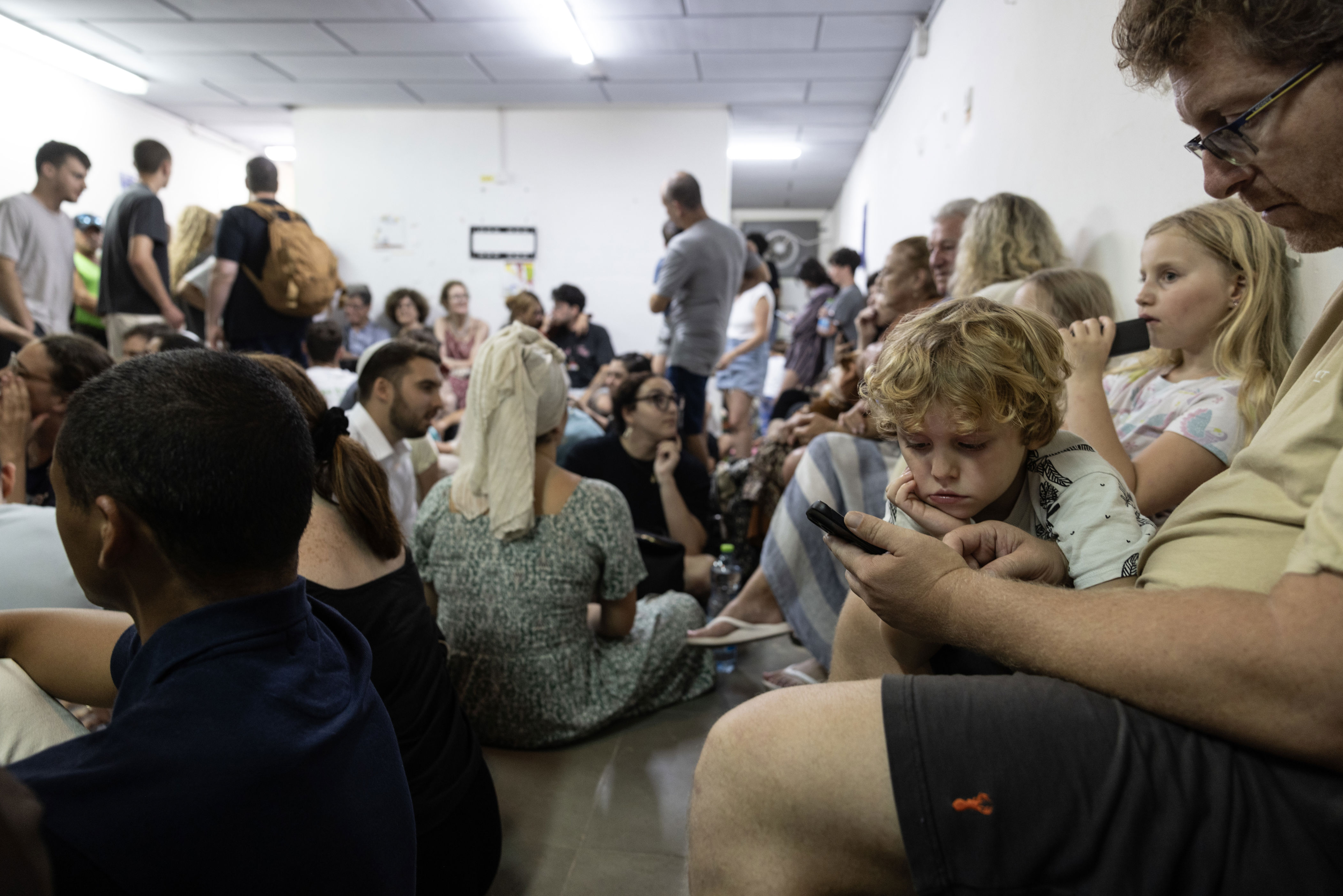
By: Shira Rubin
3:50 PM: Analysis from Lior Soroka
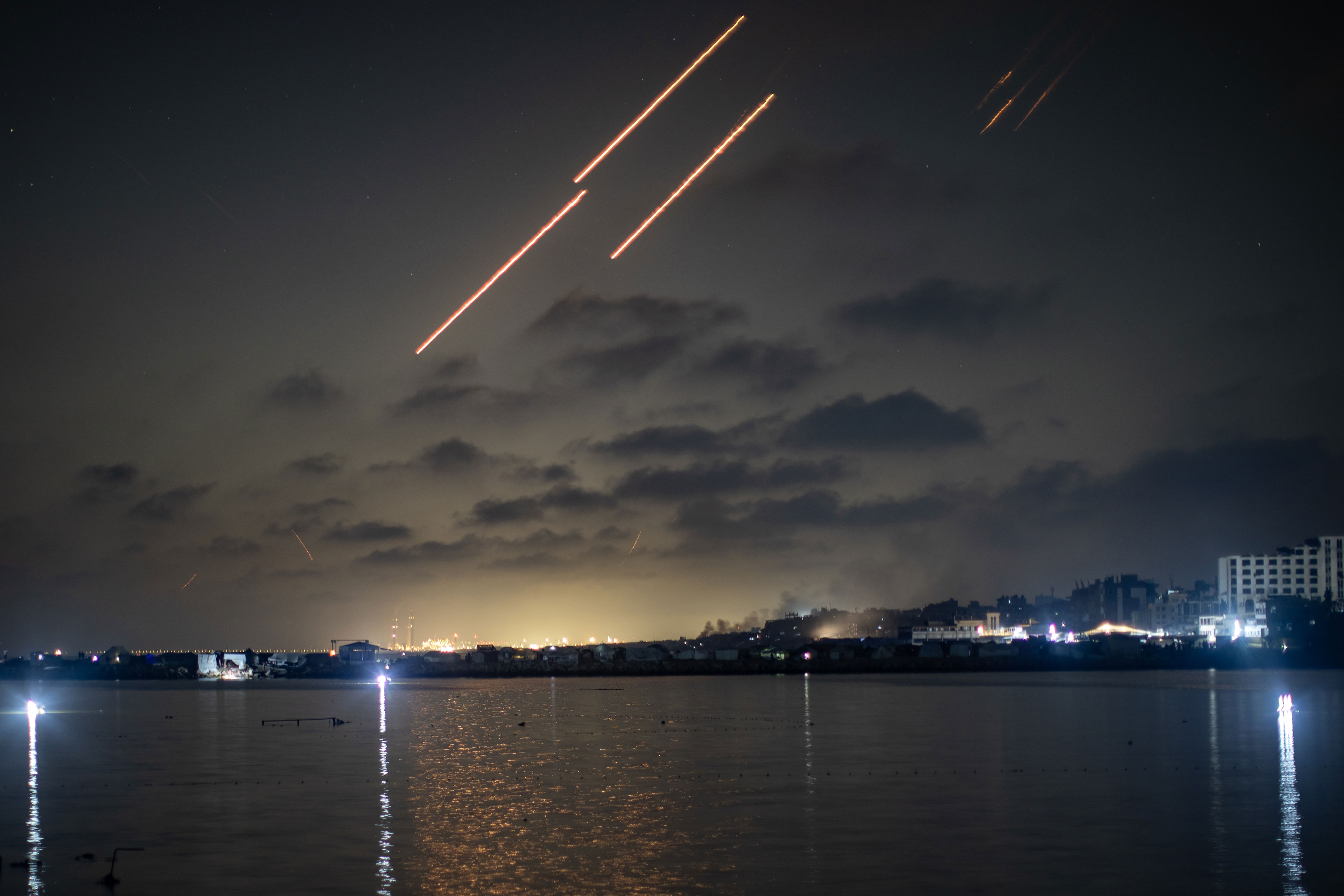
As Iran launched its counterattack against Israel, firing hundreds of ballistic missiles toward the country, Prime Minister Benjamin Netanyahu released a recorded message addressed to the Iranian people, stating that “Israel’s fight is not with you.”
“The Islamic regime which has oppressed you for almost 50 years threatens to destroy my country, the State of Israel,” he said. “As we achieve our objectives, we are also clearing the path for you to achieve your freedom.”
3:25 PM: Analysis from Mikhail Klimentov
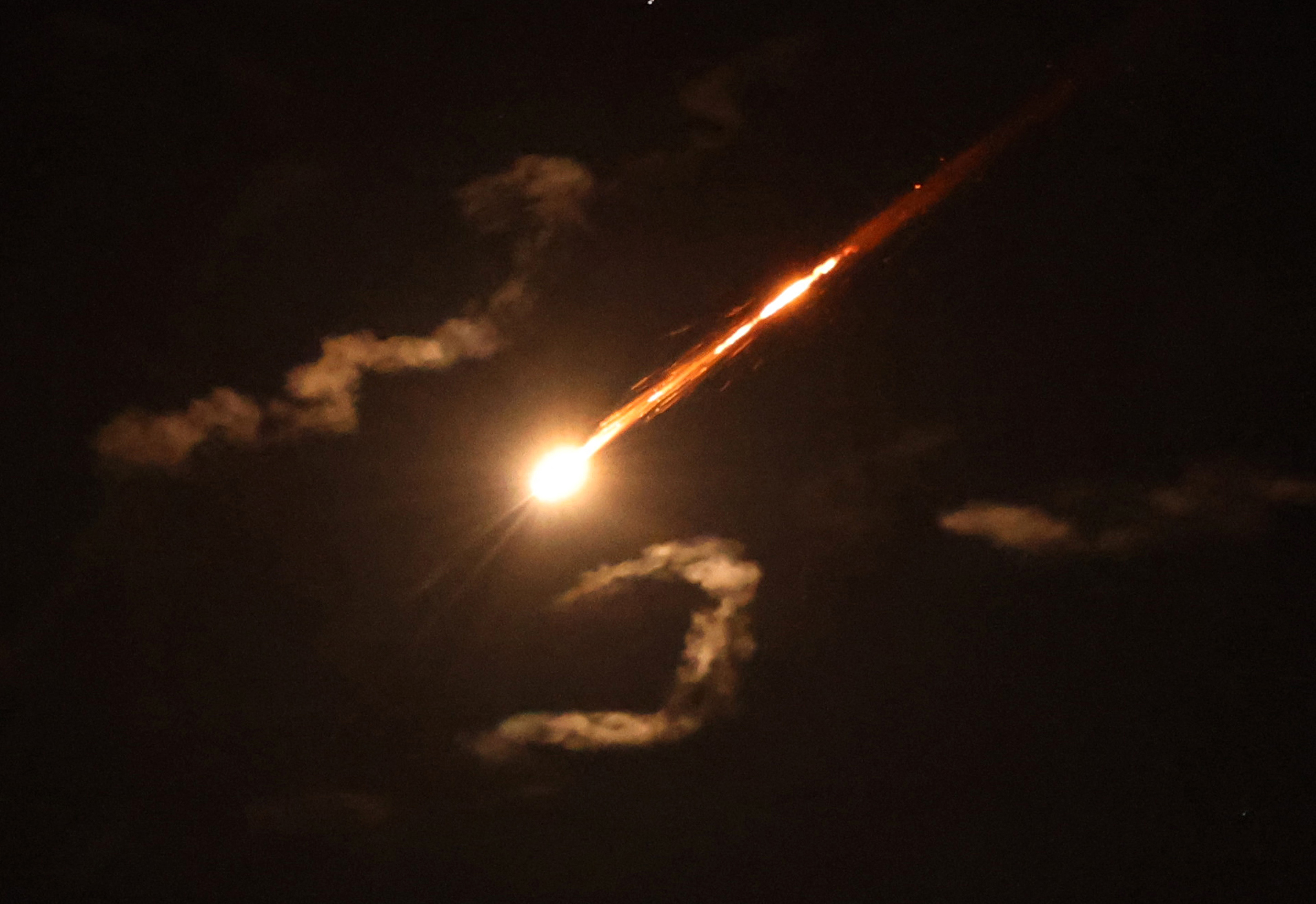
Israeli Defense Minister Israel Katz said Iran crossed a red line Friday by launching missiles “at civilian population centers in Israel.” Katz added that Iranian leaders would pay “a very heavy price.”
3:11 PM: Analysis from Joshua Yang
Israel intends to target Iran’s Fordow nuclear enrichment facility, Israeli ambassador to the United States Michael Leiter said in a Fox News interview Friday. “The entire operation really has to be completed with the elimination of Fordow,” he said.
Fordow is one of Iran’s two known nuclear enrichment sites. The facilities are considered critical to producing the purified uranium used to power civilian nuclear reactors — and which could be used to build nuclear weapons. The other enrichment site, Natanz, was damaged by Israeli strikes on Friday.
3:03 PM: How Mossad covertly prepared Israel’s attack from deep inside Iran
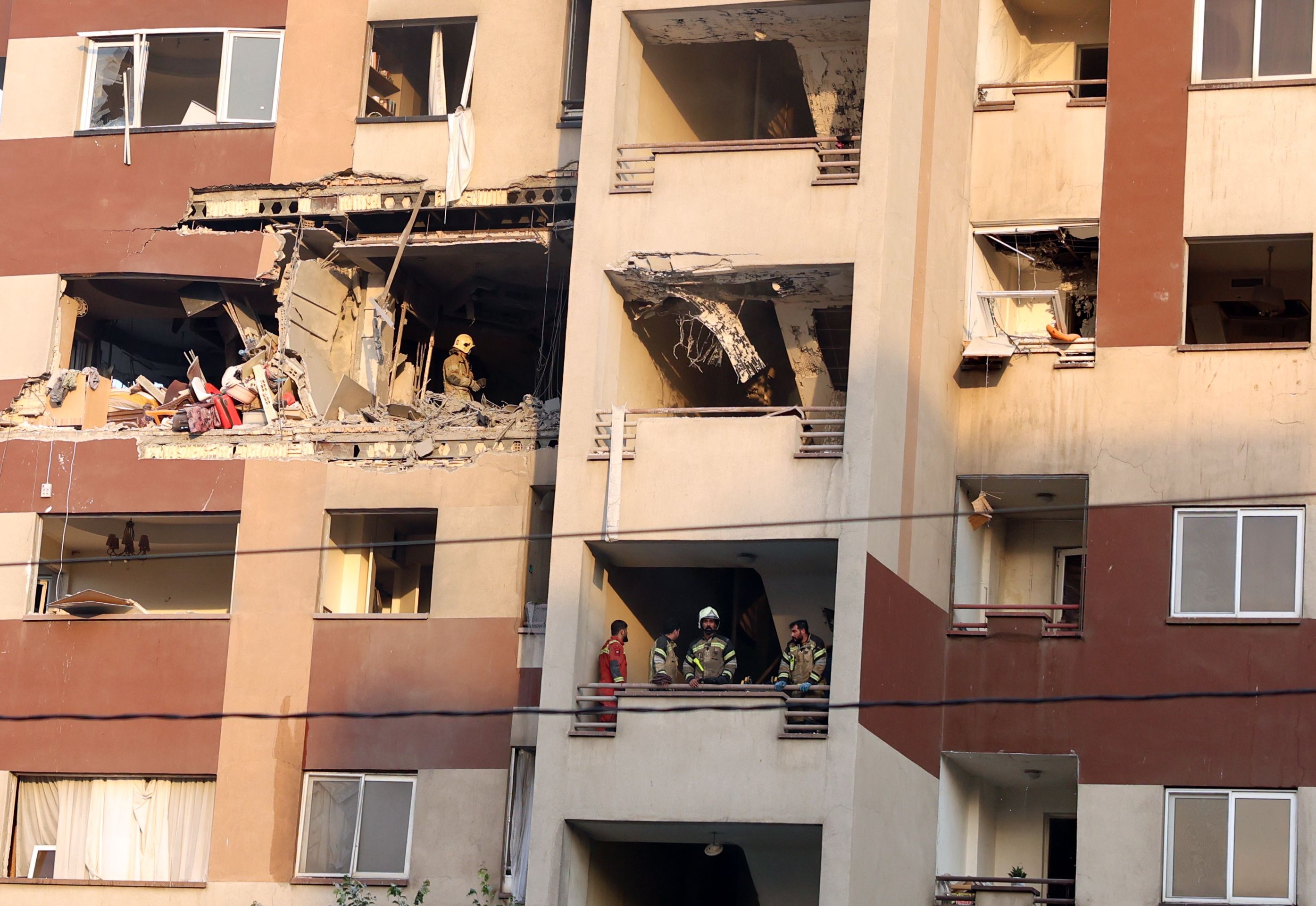
By the time Israeli aircraft were streaking across the sky toward nuclear and military sites in Iran on Friday, secret commando teams, swarms of armed drones and explosives concealed in ordinary vehicles were emerging from hiding deep inside Iran and making their way toward slumbering targets. By daybreak, members of the inner circle of Iran’s supreme leader, Ayatollah Ali Khamenei, and key figures in the country’s nuclear brain trust were dead.
Read the full story
By: Souad Mekhennet, Greg Miller and Gerry Shih
3:03 PM: U.S. Navy has broad arsenal of firepower arrayed in the Middle East
The Trump administration said that it did not participate in Israel’s sprawling attack on Iran, but the U.S. Navy does have a broad array of firepower arrayed in the Middle East if Iran decides to attack U.S. forces or interests in the region.
The fleet of warships include the aircraft carrier USS Carl Vinson, which is in the Arabian Sea with the guided-missile cruiser USS Princeton and the destroyers USS Milius, USS Sterett and USS Wayne E. Meyer, defense officials said Friday, speaking on the condition of anonymity because of the sensitivity of the issue. Two additional destroyers, the USS Truxton and USS Forrest Sherman, are in the Red Sea, while the littoral combat ship USS Canberra arrived in port in Bahrain late last month .
The Navy has three additional destroyers in the Mediterranean Sea. They are the USS Sullivans, the USS Arleigh Burke and the USS Thomas Hudner.
It’s also possible the Navy has submarines in the region, but the Pentagon often does not disclose their locations, citing security concerns.
By: Dan Lamothe
3:00 PM: Analysis from Joshua Yang
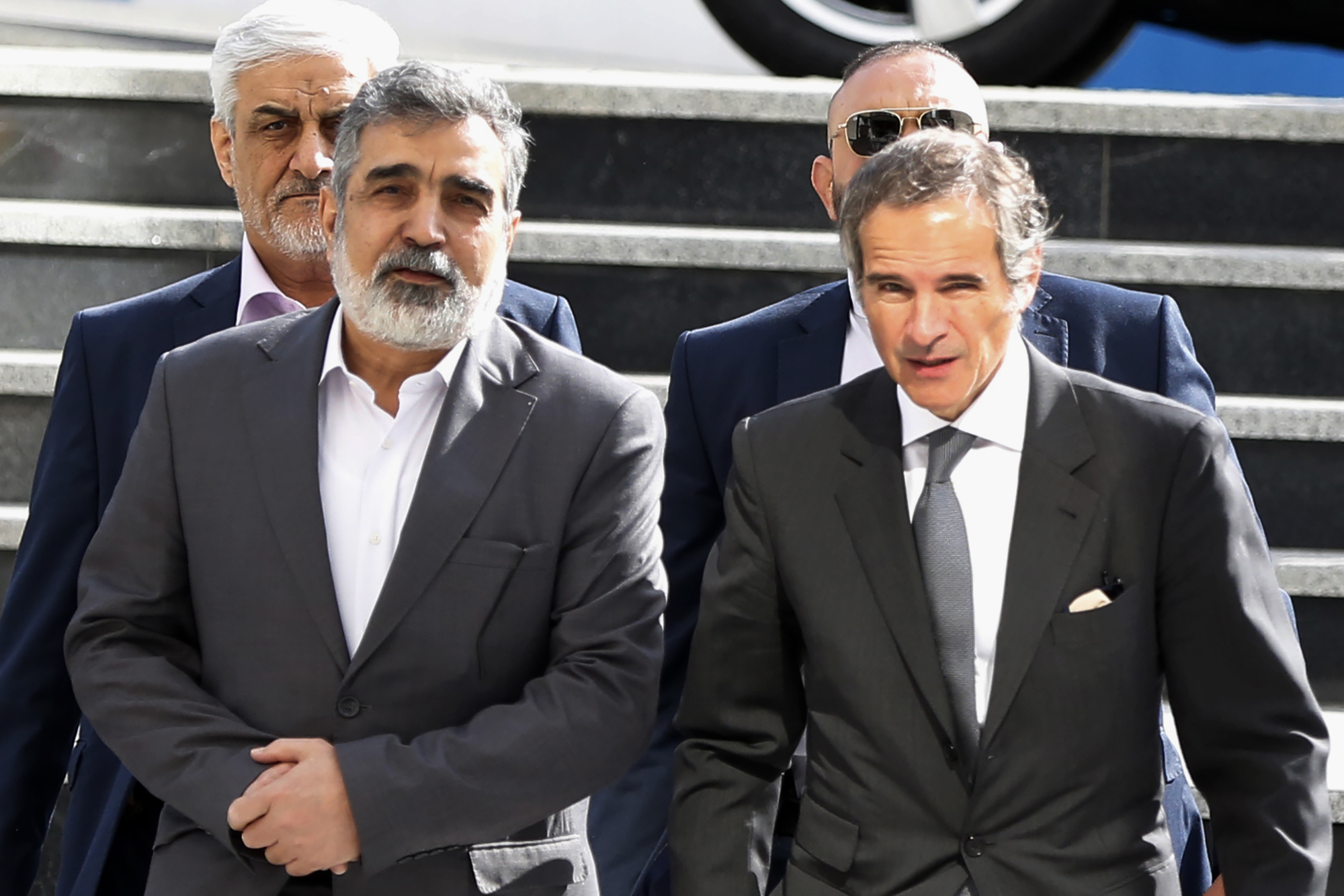
Behrouz Kamalvandi, spokesman for Iran’s Atomic Energy Organization, said that chemical and radiation pollution has been detected inside the Natanz nuclear site, which Israel struck Friday. Kamalvandi added that radiation has not spilled beyond the facility. “We need to carry out decontamination inside the site,” he said.
Natanz is Iran’s main uranium enrichment facility. As one of just two enrichment sites in the country, it is critical to Iran’s nuclear program.
2:52 PM: Iran launches ‘Operation Severe Punishment’ in response to Israeli strikes
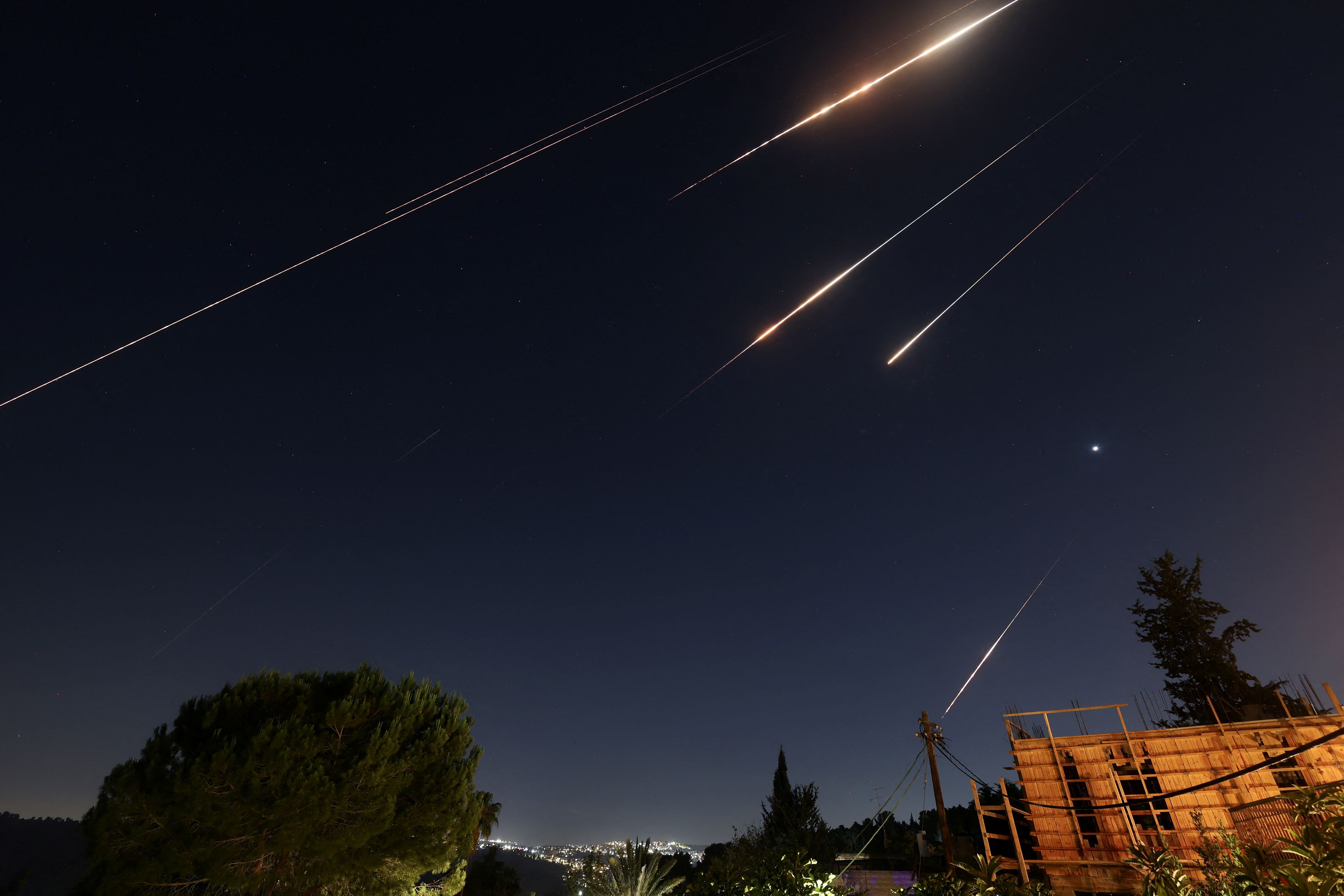
Iran has launched hundreds of ballistic missiles toward Israel, according to a social media post by the Islamic Republic of Iran News Agency (IRNA), which characterized the ongoing barrage as “decisive” and “crushing.”
“We must give a strong response to the evil, despicable, terrorist Zionist identity,” Ali Khamenei, the supreme leader of Iran, added in a statement on the social platform X. “God willing, we will respond with strength, and will show no mercy to them.”
By: Joshua Yang and Angie Orellana Hernandez
2:18 PM: Analysis from Mikhail Klimentov
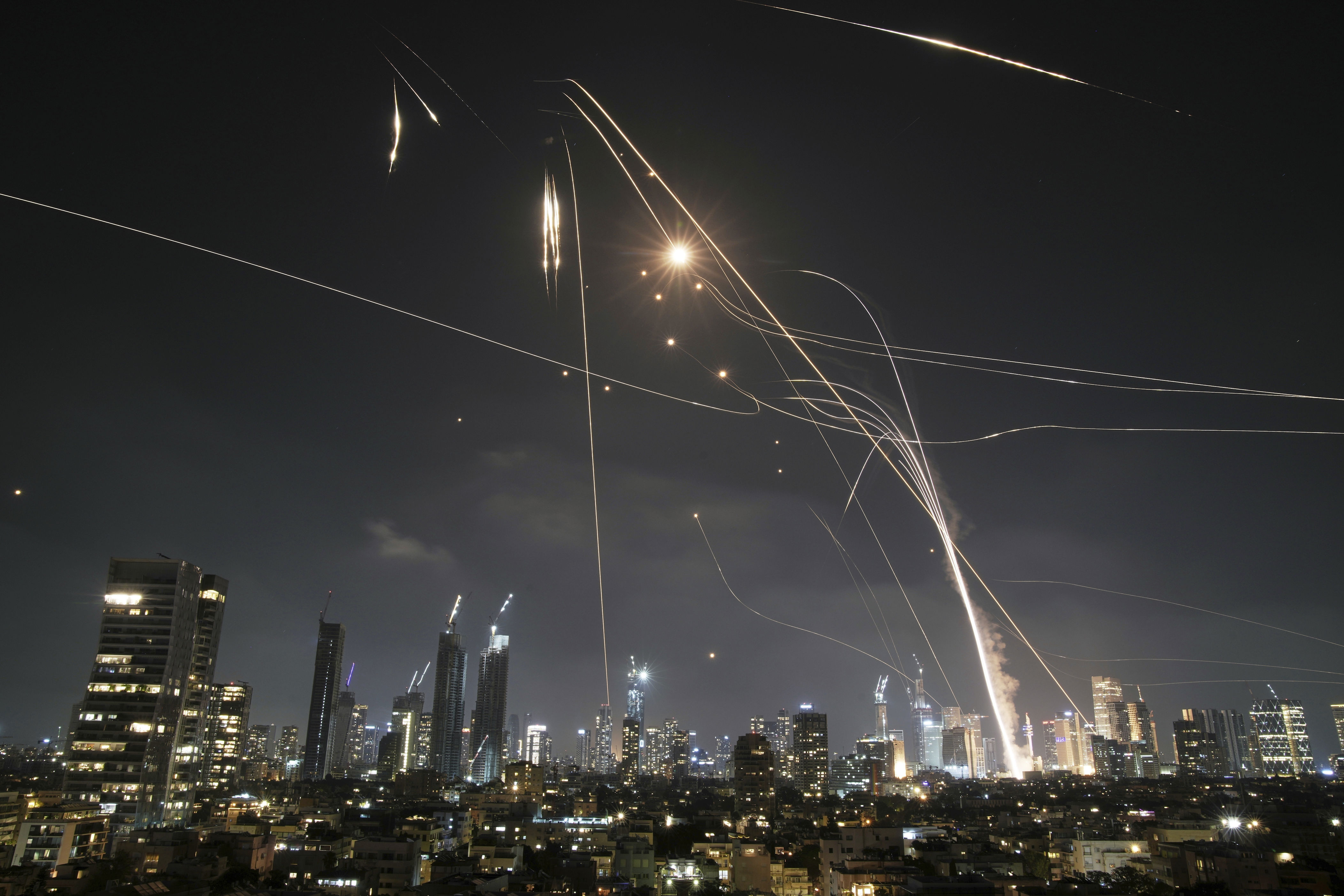
Loud explosions rang out in Tel Aviv shortly after sirens were activated. Sirens also briefly sounded in Jerusalem. The Israel Defense Forces said it had identified missiles inbound from Iran.
2:14 PM: Analysis from Mikhail Klimentov
Russian President Vladimir Putin spoke with both Iranian President Masoud Pezeshkian and Israeli Prime Minister Benjamin Netanyahu on Friday — condemning Israel’s attacks in his call with the former and urging Israel to return to the negotiating table when speaking with the latter.
In both conversations, Putin offered to serve as a mediator, according to a Kremlin readout of the call.
1:50 PM: Analysis from Joshua Yang
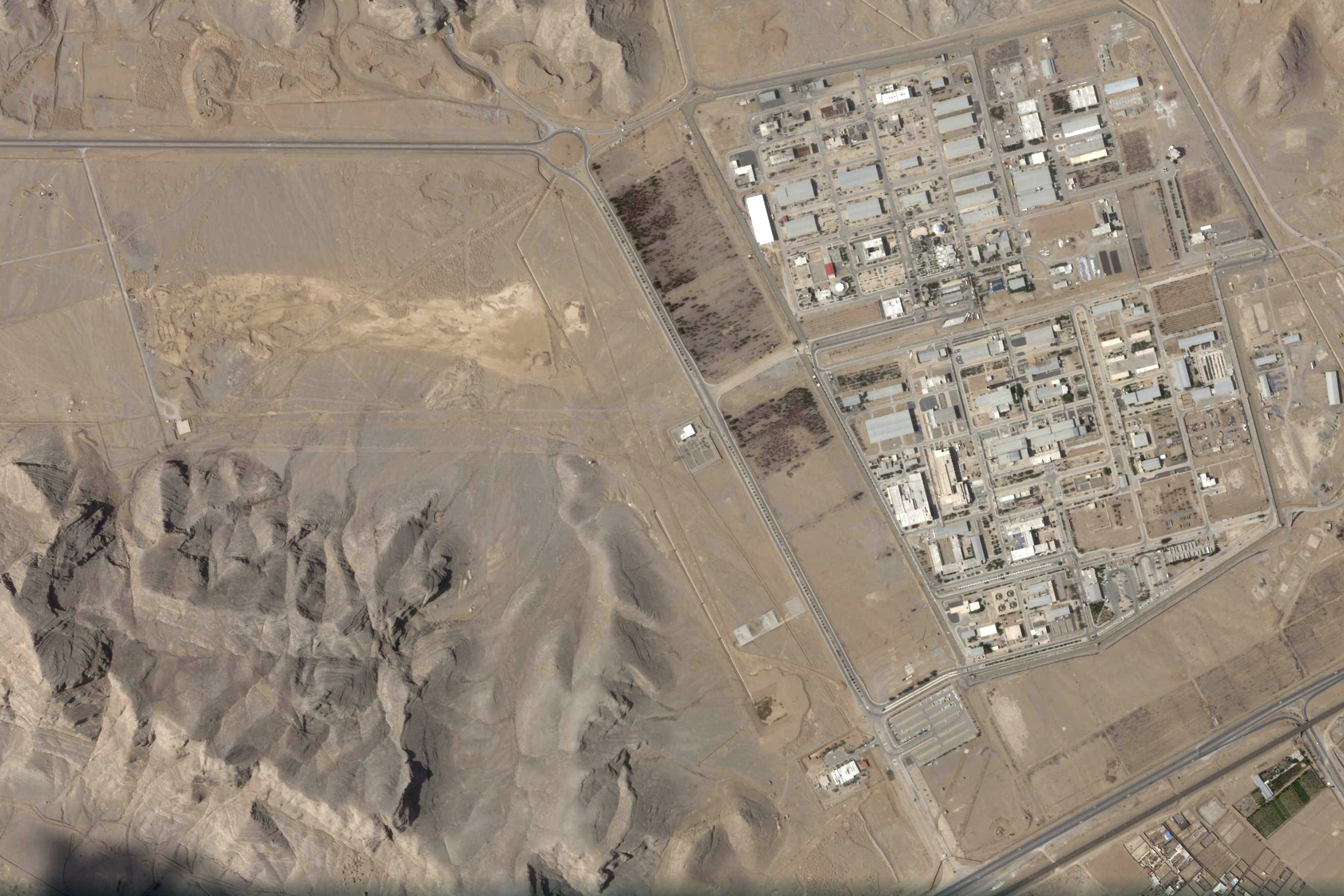
Israel struck the Isfahan Nuclear Technology Center on Friday, said IDF spokesperson Effie Defrin in a news briefing. Isfahan is a multipurpose research center employing around 3,000 scientists, according to the Washington-based Nuclear Threat Initiative.
The attack on Isfahan follows a confirmed strike on the Natanz nuclear enrichment facility during the first wave of ongoing Israeli operations.
1:35 PM: Analysis from Claire Parker, Cairo bureau chief
Three Palestinian children were injured by shrapnel from a missile that fell outside of the southern West Bank city of Hebron on Friday evening local time, official Palestinian Authority news agency WAFA reported.
Paramedics from the Palestinian Red Crescent Society transported the three children — ages 12, 7 and 6 — to a hospital, the report added. The Israel Defense Forces said a missile launched from Yemen fell in the area, and “no interceptors were launched.”
“The details of the incident are under review,” the IDF statement added.
1:25 PM: Analysis from Angie Orellana Hernandez, National Breaking News Reporter
The State Department urged U.S. citizens in Iran to immediately leave and to avoid travel to the country “for any reason.” Those unable to leave should shelter in place, according to a security alert posted Friday.
“U.S. citizens in Iran face serious, increasing dangers due to rising regional tensions,” the alert read.
1:24 PM: Iran’s nuclear program ‘cannot be destroyed through kinetic means,’ Israeli official says
“You can’t destroy with bombs the will to recover and once again pursue the goal of destroying Israel,” Israeli national security adviser Tzachi Hanegbi said in an interview with Channel 12’s “Meet the Press.”
Hanegbi added that Iran’s nuclear program “cannot be destroyed through kinetic means. What can be done is what happened in Libya and South Africa, where the accumulated balance of costs and benefits led a country’s leadership to decide to stop.”
According to him, “only the Americans can make that happen. Only President [Donald} Trump can bring what is called ‘a good deal’ — one in which Iran willingly dismantles its nuclear weapons program, pays a heavy price, but also gains significant benefits.”
By: Lior Soroka
1:21 PM: Strikes on Iranian nuclear scientists echo previous slayings
Israeli strikes Friday that killed two top Iranian nuclear scientists, according to state media, were not the first attacks attributed to Israel on key figures in Iran’s nuclear program.
Mohsen Fakhrizadeh, an Iranian nuclear physicist, was killed by gunfire while driving along a rural road outside Tehran in November 2020. Though Fakhrizadeh had been a prominent figure in Tehran’s since-abandoned nuclear weapons program in the late 1990s and early 2000s, his role in the modern Iranian nuclear program was reportedly limited at the time of his death.
Iran blamed Israel for the killing. Israel denied responsibility, but a senior U.S. official speaking on the condition of anonymity to discuss a sensitive matter told The Washington Post at the time that there was “absolutely no information indicating that it was anyone other than the Israelis.”
In what came closest to an admission of responsibility for the Fakhrizadeh killing, Yossi Cohen, the then-departing head of Israel’s spy agency, told an Israeli reporter in 2021: “If the scientist is willing to change career and will not hurt us anymore, then yes, sometimes we offer them” a way out.
Five other scientists associated with Iran’s nuclear program were killed in the early 2010s in apparent foreign-orchestrated assassinations involving car bombs, drive-by shootings and, in one case, what appeared to be radiation poisoning . Israel has neither confirmed nor denied involvement in the killings.
Fereydoun Abbasi, the head of Iran’s Atomic Energy Organization between 2011 and 2013, narrowly survived a car bombing in November 2010. On Friday, he was killed in Operation Rising Lion, Israel’s ongoing attacks on Iran.
By: Joshua Yang
12:58 PM: What’s happened between Iran and Israel since Oct. 7, 2023
On Friday, the decades-long tension between Israel and Iran reached a new peak as Israel launched attacks on Iranian nuclear and military facilities, killing some of the country’s top commanders. But the latest developments come 20 months after the Hamas-led attacks of Oct. 7, 2023, and the start of Israel’s war in Gaza, which pitted Iran and its regional proxies against Israel. Here’s what to know:
- October 2023: Within days of the Oct. 7, 2023, Hamas-led attack on Israel, Iran’s supreme leader Ayatollah Ali Khamenei denies any Iranian involvement in the attacks. Current and former Western and Middle Eastern intelligence officials tell The Washington Post that while Tehran’s precise role in the attack is unclear, Iran provided Hamas with military training, logistical help and financial support. Iranian-backed proxies, including Lebanon’s Hezbollah and Yemen’s Houthis, pledge attacks against Israel in response to the war in Gaza.
- April 1, 2024: Two senior members of Iran’s Islamic Revolutionary Guard Corps are killed in a suspected Israeli airstrike on a building next to the Iranian Embassy in the Syrian capital Damascus.
- April 13, 2024: Iran responds by launching a wave of missiles and drones toward Israel.
- July 31, 2024: Israel kills Hamas’s political leader Ismail Haniyeh in a strike on the Iranian capital Tehran, though Israel’s defense minister only confirms his country’s role in the assassination months later.
- Sept. 27, 2024: Israel kills Hasan Nasrallah , the leader of Lebanon’s Iran-backed political and militant group Hezbollah, in a strike on Beirut. The attack comes amid a deadly Israeli offensive in Lebanon against Hezbollah.
- Oct. 1, 2024: Iran fires about 180 ballistic missiles at Israel, according to the Israeli military ; Iran says the attack was in retaliation for Nasrallah’s killing.
- Oct. 26, 2024: Israel carries out waves of “precise strikes” against Iran that the Israeli military says targeted “manufacturing facilities used to produce the missiles that Iran fired at the State of Israel over the last year.”
- 2025: After a meeting with Secretary of State Marco Rubio, Israeli Prime Minister Benjamin Netanyahu says that “Israel and America stand shoulder to shoulder in countering the threat of Iran .” But President Donald Trump repeatedly bypasses Israel , including by announcing nuclear talks with Iran and making a truce with Yemen’s Iran-backed Houthi rebels. In late May, Trump says he cautioned Israeli Prime Minister Benjamin Netanyahu against striking Iran amid the talks with Tehran.
By: Victoria Bisset
12:30 PM: Analysis from Yeganeh Torbati, Economic policy reporter
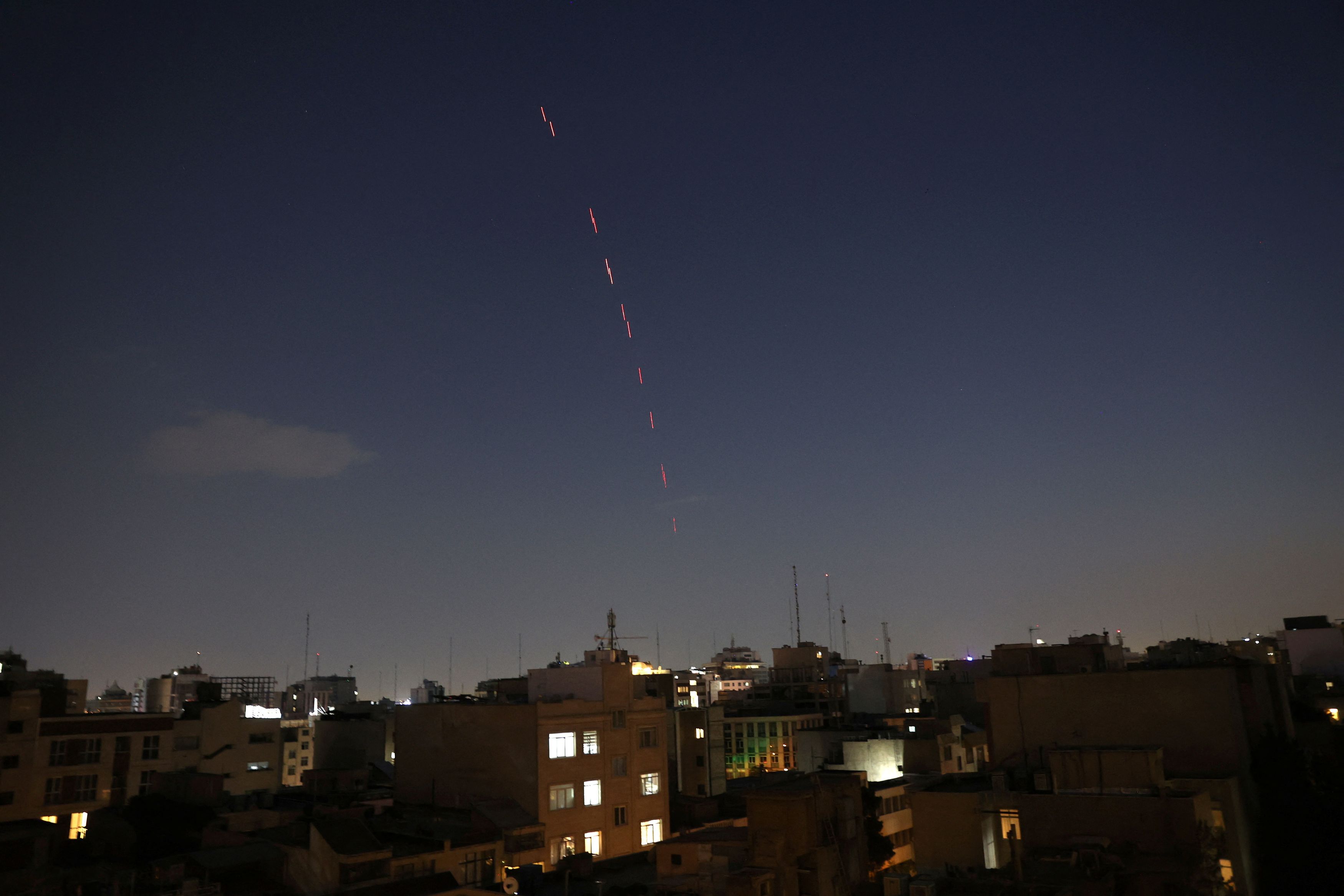
There are signs as of Friday night in Iran that Israeli attacks are ongoing. Two Tehran residents said they heard multiple explosions around 7:20 p.m. local time. One woman said people were crowded outside gas stations fueling their cars and trying to get out of the capital.
12:27 PM: Analysis from Yeganeh Torbati, Economic policy reporter
Iran’s supreme leader, Ayatollah Ali Khamenei, said Friday morning in a statement that Israel “must expect a severe punishment” for its attacks on Iran. He said some military commanders and scientists were killed in the attacks. Israel has created a “bitter and painful fate” for itself, the statement said.
12:09 PM: Analysis from Erin Cunningham, Weekend Foreign editor
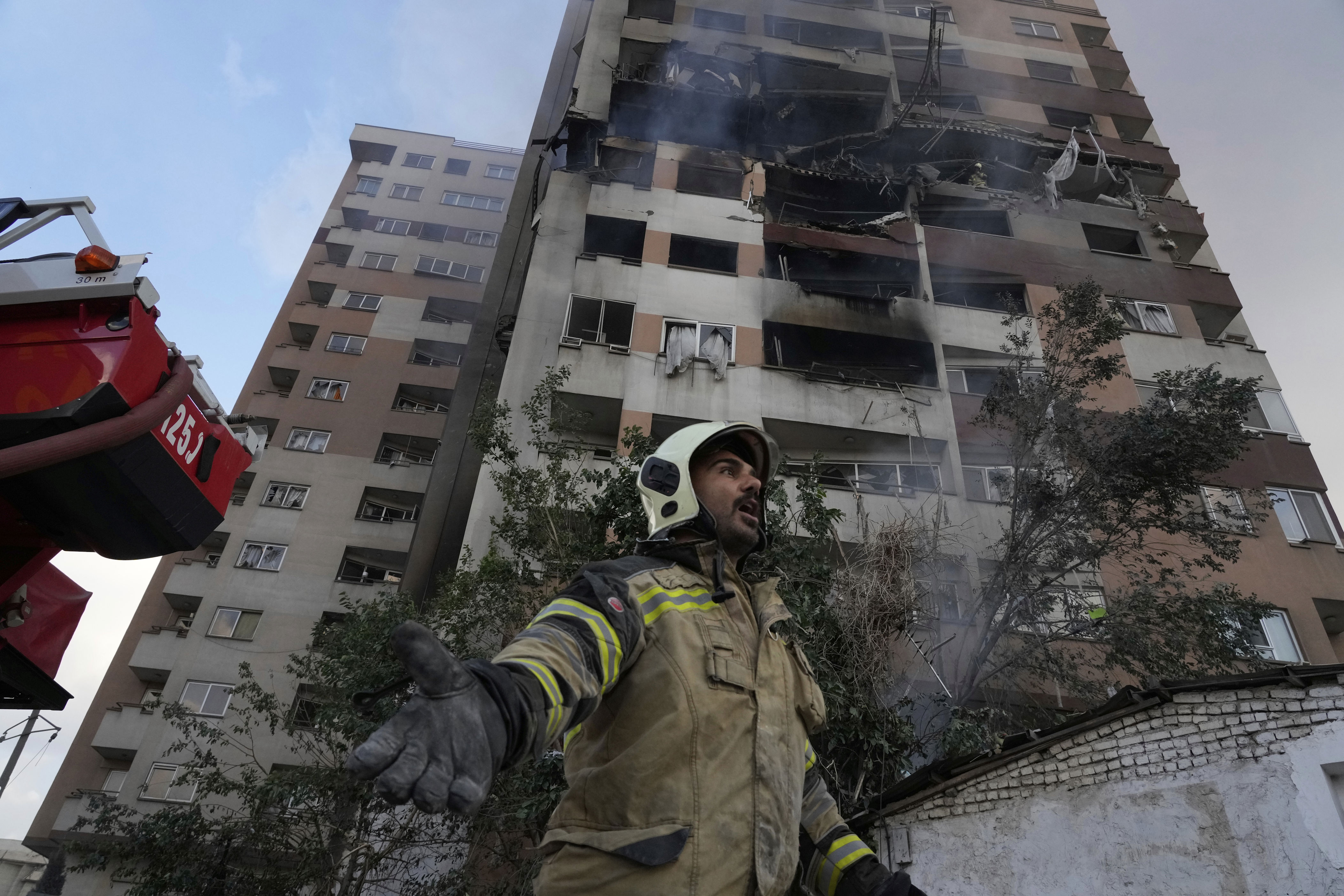
The strikes in Iran marked the biggest attack the country has faced since the Iran-Iraq War in the 1980s, according to Ellie Geranmayeh, a senior policy fellow at the European Council on Foreign Relations.
“Israel’s unprecedented strikes across Iran overnight were designed to kill President Trump’s chances of striking a deal to contain the Iranian nuclear program,” Geranmayeh said.
11:44 AM: Analysis from Nilo Tabrizy, Visual Forensics Reporter
Images verified by The Washington Post show that at least five residential buildings in Tehran appear to have been damaged by Israeli strikes. One video filmed by an apparent bystander at the Asatid-e Sarv Complex in northwestern Tehran shows the residential building burning as emergency responders try to contain the fire. It was first published to X at 8:30 p.m. Eastern time Thursday. Buildings in other areas of Tehran including Shahid Chamran Town, Narmak, Sattar Khan and Marzdaran were also hit, according to visuals reviewed by The Post.
One graphic video posted online also on Thursday shows a young child under the rubble of a building. Bystanders are heard telling each other to “go” as they film the blaze. The Post could not confirm the location within Iran where the video was shot. Civilians died in the strikes, according to Iranian state media .
11:41 AM: U.S. still wants talks with Iran, senior administration official says
The United States remains interested in conducting talks Sunday with Iran about its nuclear program, a senior administration official told The Washington Post on Friday, despite devastating Israeli attacks that have left several senior Iranian officials dead and its military reeling.
Special envoy Steve Witkoff had been expected to travel to Oman on Sunday to meet with Iranian officials for the latest round of nuclear talks. The planned talks had led some analysts to believe that expected Israeli strikes on Iranian nuclear facilities would not take place before that date, leading to speculation after the strikes that the talks were kept on the calendar to mislead Tehran.
“This narrative is completely false,” said the senior administration official, speaking on the condition of anonymity to respond to the speculation. “We have always wanted peace with Iran. We still do. And we still want to have talks.”
It is not clear whether Iranian officials will agree to continue nuclear discussions with the United States after the attacks Friday morning.
By: Adam Taylor
11:25 AM: Trump says he had knowledge of Israel’s plans, continues to urge Iran deal
President Donald Trump told the Wall Street Journal on Friday that his administration was aware of Israel’s plan to strike Iranian nuclear and military sites. In an interview with the newspaper, Trump said he spoke Thursday with Israeli Prime Minister Benjamin Netanyahu and intends to do so again Friday.
Secretary of State Marco Rubio said in a statement Thursday night that the United States was not involved in the strikes but that Israel “advised us that they believe this action was necessary for its self-defense.” Trump hinted that he anticipated the attack during remarks earlier Thursday at the White House.
Trump also discussed the aftermath of Israel’s strikes by phone with prominent journalists, including Bret Baier of Fox News , Jonathan Karl of ABC News and Dana Bash of CNN .
During the calls, Trump largely echoed the comments he has made on social media pushing for Iran to negotiate with the U.S. on limiting its nuclear program before it faces further attacks.
In a post to his social media platform Truth Social on Friday morning, Trump admonished Iran for not coming to a renewed nuclear deal sooner. “JUST DO IT, BEFORE IT IS TOO LATE.”
“Two months ago I gave Iran a 60 day ultimatum to ‘make a deal,’ ” he wrote hours later. “They should have done it! Today is day 61. I told them what to do, but they just couldn’t get there. Now they have, perhaps, a second chance!” Trump in 2018 withdrew from a 2015 nuclear deal negotiated with Iran by the Obama administration and five other world powers.
By: Patrick Svitek and Angie Orellana Hernandez
10:59 AM: Leaders in Europe, U.K. call for de-escalation
French President Emmanuel Macron called on “all parties to exercise maximum restraint and to de-escalate” in a bid to “avoid jeopardizing the stability of the entire region,” in a post on X on Friday afternoon.
“France has repeatedly condemned Iran’s ongoing nuclear program and has taken all appropriate diplomatic measures in response,” Macron wrote. “In this context, France reaffirms Israel’s right to defend itself and ensure its security.”
Earlier in the day, the French president convened his country’s National Defense and Security Council in light of the strikes. Vowing to work with partners to push for de-escalation in the region, Macron said he also spoke Friday with leaders in Saudi Arabia, Jordan, the United Arab Emirates, Qatar, Germany, the U.K. and the U.S. “Peace and security for all in the region must remain our guiding principle,” Macron said.
British Prime Minister Keir Starmer also called for tensions to be reduced. “Now is the time for restraint, calm and a return to diplomacy,” he said in a statement.
Kaja Kallas, the European Union’s high representative for foreign affairs and security policy, described the situation as “dangerous” and urged restraint in a post on X . “Diplomacy remains the best path forward, and I stand ready to support any diplomatic efforts toward de-escalation,” she said.
“Alarming attacks in the Middle East. The Netherlands urges all parties to exercise restraint and refrain from further attacks and reprisals,” Dutch Prime Minister Dick Schoof wrote on X . “Immediate de-escalation is essential in the interest of stability in the region.”
By: Kate Brady
10:15 AM: Who was Hossein Salami, the IRGC commander killed in Iran?
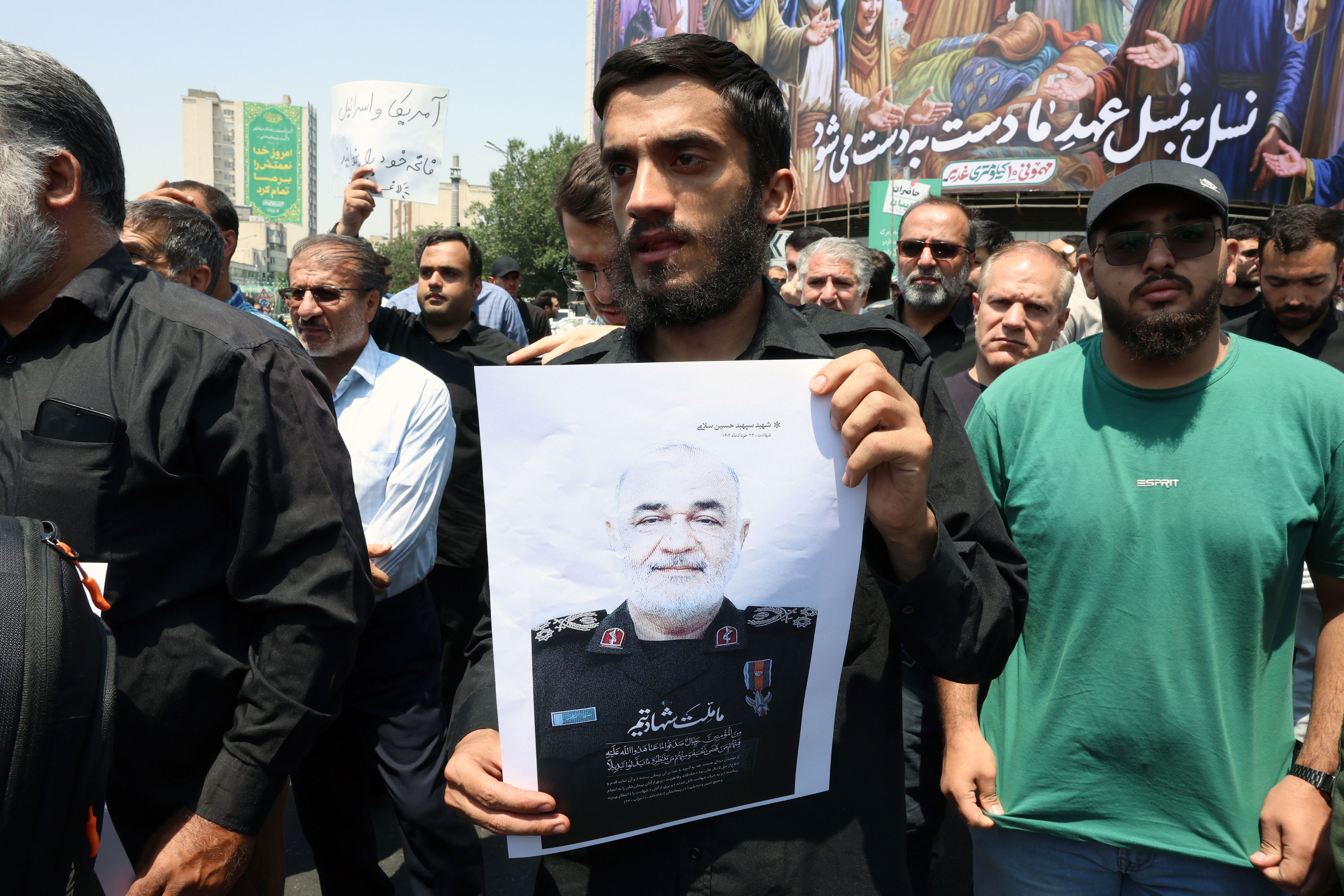
Hossein Salami, commander of Iran’s Islamic Revolutionary Guard Corps, was killed in Israel’s strike against Iran on Friday. He has been replaced by Mohammad Pakpour as commander in chief of the IRGC, Iran’s Supreme Leader Ayatollah Ali Khamenei said in a post on X.
As commander of the IRGC, Salami presided over a sprawling organization that runs in parallel to Iran’s military and includes the Quds Force, which trains and directs Iranian overseas proxy forces, and the Basij militia, focused on enforcing domestic security.
In a statement, the IRGC said he was “a man of struggle in the scientific, cultural, security, and military arenas. He was present on all fronts with a sincere, wise spirit, and a commitment to the Guardianship of the Order, in the front lines defending the ideals of the Revolution and the people.”
Salami was appointed head of the IRGC in 2019, the Associated Press reported . He joined the group at the beginning of the 1980s Iran-Iraq war and rose to lead its air force. He was serving as deputy commander when he was appointed to the leadership role, the news agency reported.
After the United States killed the powerful head of the Quds Force, Qasem Soleimani, in a drone strike in 2020, Salami said the United States and Israel should know that “if they threaten our commanders, none of their commanders will find a safe place” to live, the AP reported . He also ordered Iran’s first-ever direct military attack on Israel, an operation that saw more than 300 drones and ballistic missiles launched toward Israel in April 2024 after an Israeli strike that killed two Iranian generals and other Iranian military officers at a compound in Syria.
On Thursday, Salami said Iran stood “fully ready for any scenarios, situations and circumstances” in reference to reports that Israel was preparing an attack on Iran in comments reported by Iran’s semiofficial Mehr News Agency . “We are ready, and this is the reality we have been living with for years because being prepared for a war on any scale is our job and duty,” he said.
Analysts said the killings of Salami and other military leaders will affect Iran’s response to the attack. The deaths may “greatly hinder Iran’s ability to make decisions and coordinate a response, similar to what happened recently in Lebanon, when Israel killed most of Hezbollah’s top leadership,” the Eurasia Group, a political risk consulting firm, said in an analysis Friday, in reference to Israel’s strikes against leaders of the Lebanese militant group.
By: Victoria Craw and Kareem Fahim
9:29 AM: Higher oil prices after Israel’s strikes could boost Russia war efforts
If the spike in crude oil prices caused by Israel’s strikes on Iranian nuclear and military facilities continues, Russia could be a big winner, according to analysts, as it relies heavily on oil revenue to pay for its war on Ukraine.
Oil prices jumped nearly 9 percent on Friday, according to Reuters. A sustained rise would relieve the intense pressure on Russia’s budget this year due to recent lower oil prices. Russia on Wednesday had to revise its budget, due to earlier forecasts of a $15 billion drop in revenue for the year.
Russia’s budget in December was predicated on revenue of $508 billion, but until Friday’s price rise, the revised forecast was $486 billion. In December, Russia’s deficit was projected at just over $15 billion, but the total for just the first five months of the year was $44 billion, according to the Finance Ministry. The revised deficit for the year was projected at about $50 billion.
Russia’s defense and security spending in 2025 reached around 40 percent of the budget, largely to fund the war on Ukraine.
Pro-Kremlin political analyst Sergei Markov posted on Telegram that the Israeli strikes would help Russia in its war on Ukraine by increasing oil prices and distracting global attention from the conflict.
“U. S. military resources will be directed to the Middle East and there will be no American weapons to Ukraine,” Markov wrote. “The price of oil will rise. Russia will receive more revenue.”
In addition, China would have to increase its reliance on Russian oil and in return could help Russia with military aid, he predicted. China buys about 90 percent of Iran’s oil, Reuters reported , amounting to around 16 percent of its crude oil imports in March.
By: Robyn Dixon
9:17 AM: Israeli hospitals on high alert; patients moved underground

Hospitals across Israel were placed on the highest alert Friday, and the Ministry of Health instructed hospitals to relocate to fortified underground facilities and discharge patients who don’t require hospitalization. Some wards moved to parking garages that function as underground hospitals.
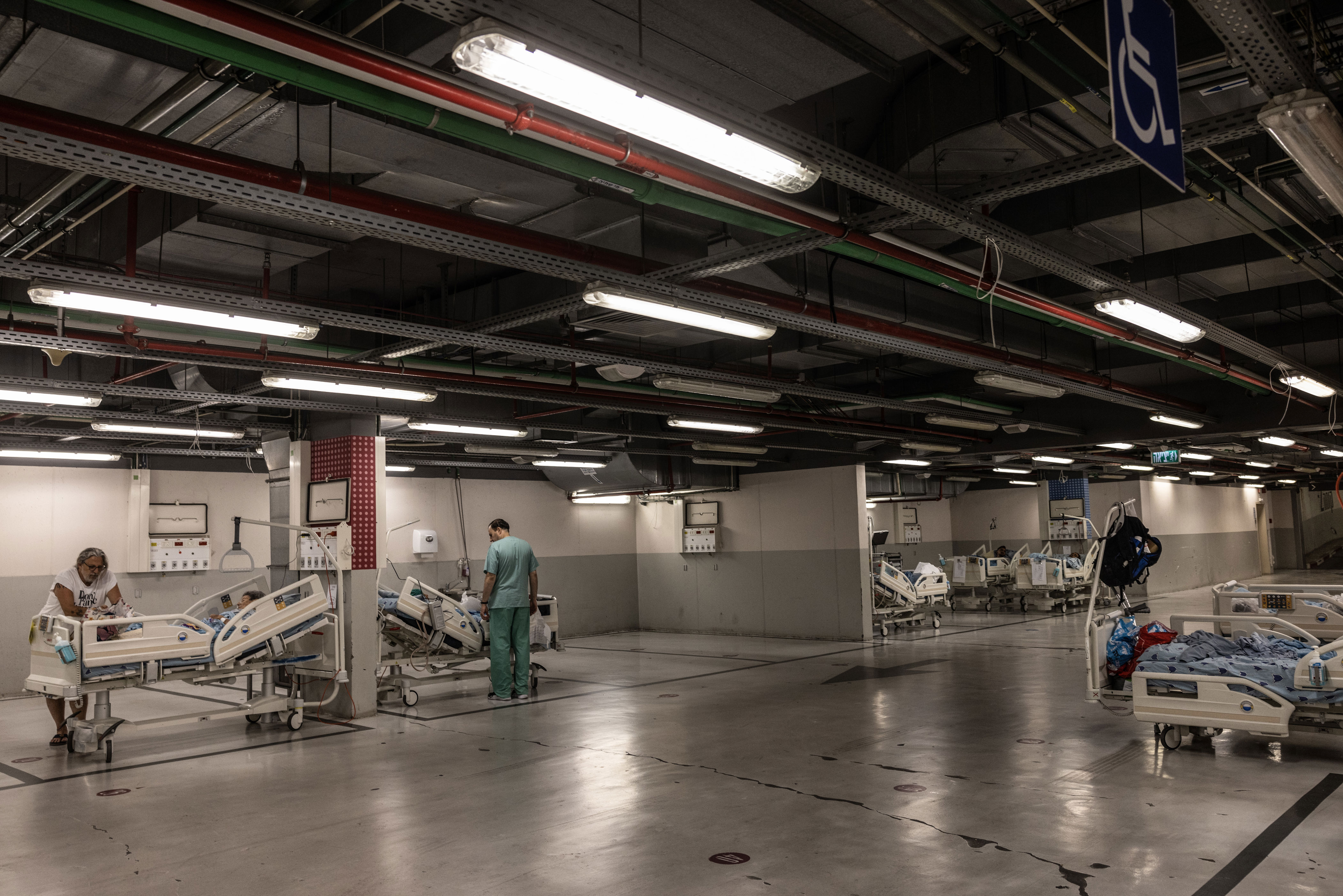
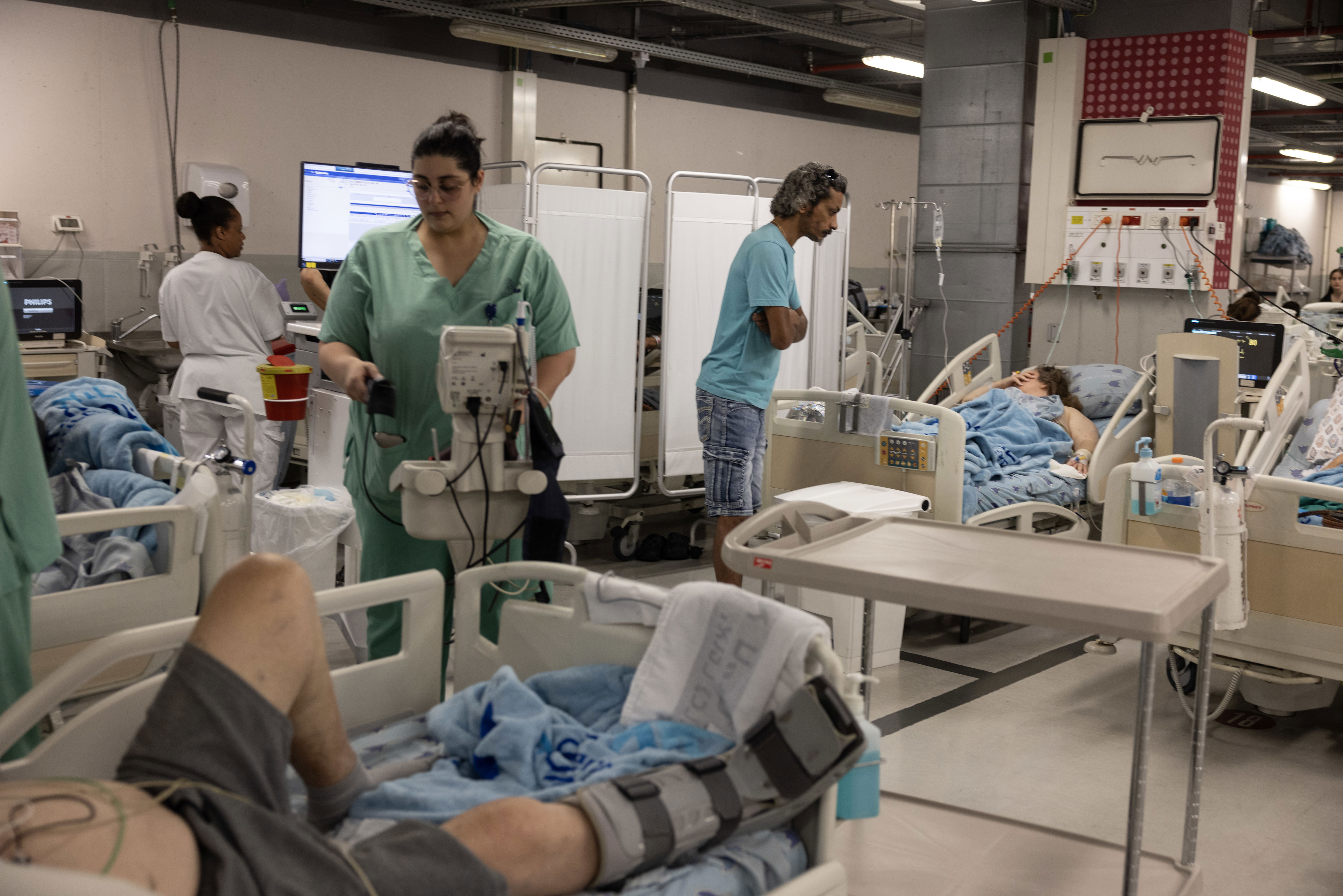
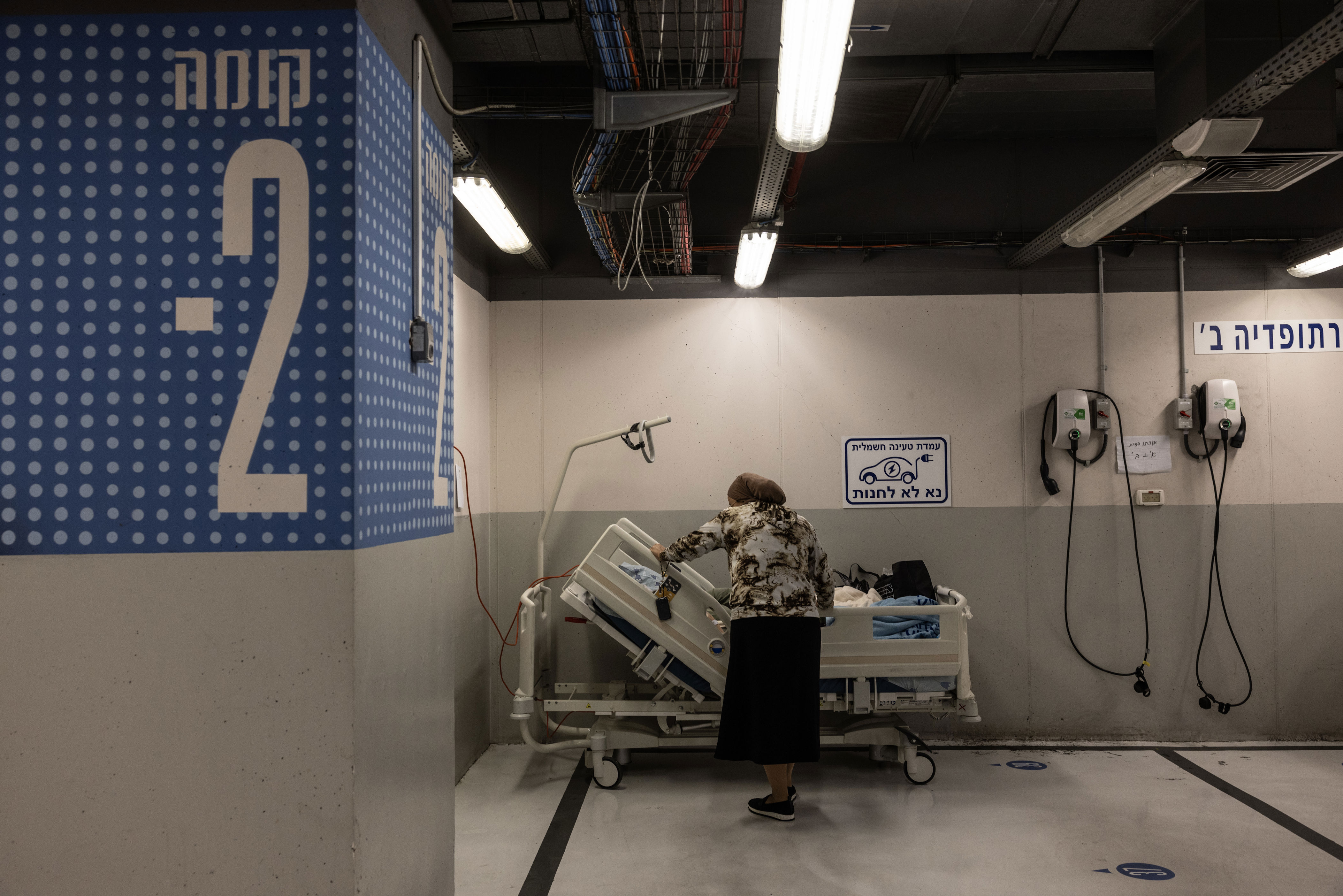
By: Heidi Levine
8:42 AM: Tehran residents express shock and fear after strikes
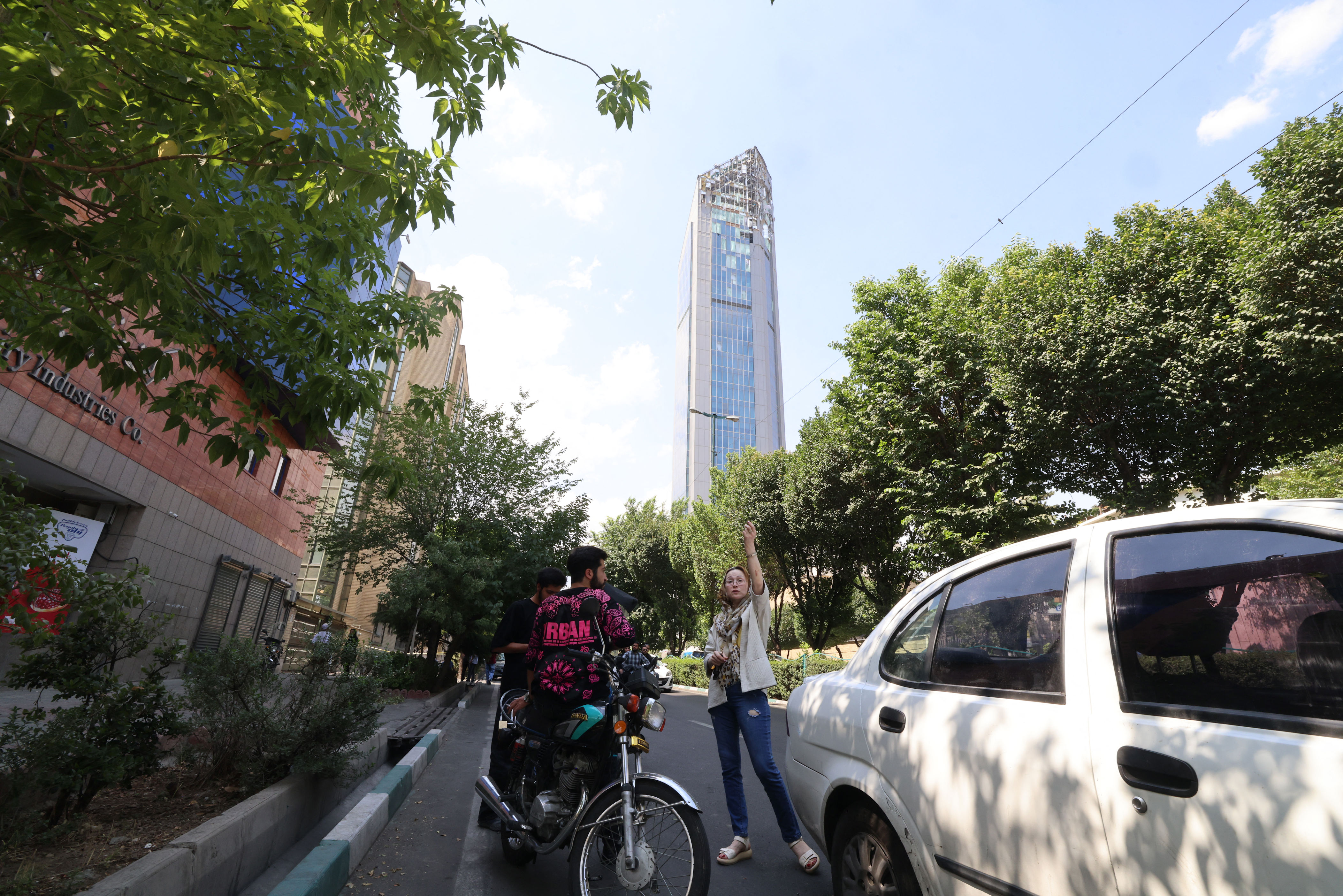
Iranians were in a state of shock Friday, though normal life also continued, two Tehran residents told The Washington Post. One woman, Mahtab, said that people were doing their shopping and going to coffee shops, but also seemed to be shocked at what had occurred overnight. Friday is a day off in Iran, and Saturday is an official religious holiday.
One man living in Tehran, Nima, said two residential buildings and one commercial building near him had been targeted in the Israeli attack. “People are terribly scared,” he said. “No one expected … when negotiations with America are still going on, for an attack to suddenly take place.”
The two residents spoke on the condition that only their first names be used for security reasons.
By: Yeganeh Torbati
8:34 AM: Analysis from Yeganeh Torbati, Economic policy reporter
Iran’s Ministry of Communications announced Friday that it had temporarily limited Iranians’ access to the internet, citing “the special conditions of the country,” according to a statement carried by Iranian media.
8:01 AM: Analysis from Mary Ilyushina
The Kremlin is concerned about the sharp escalation in tensions between Israel and Iran and condemns it, spokesman Dmitry Peskov said, adding that President Vladimir Putin is following the situation with reports from the ministries of foreign affairs and defense, as well as intelligence.
7:55 AM: Analysis from Victoria Bisset, Breaking news, international news
Iran has confirmed the death of a fourth senior commander in Israel’s attacks on the country’s nuclear and military facilities.
Iran’s state broadcaster reported that Amir Ali Hajizadeh, the head of the Islamic Revolutionary Guard Corps’ Aerospace Forces, was among those killed.
7:38 AM: Video shows aftermath of Tabriz airport strike
Video recorded in Tabriz and verified by The Washington Post shows dark plumes of smoke coming from the Tabriz airport, which is used for civilian and military purposes. Another video shot from a residential building in Tabriz and first verified on X shows a different angle of the strike.
A journalist from Iran’s semiofficial Mehr News Agency also uploaded footage. “This is a reporter from Mehr News Agency. It’s 12:30 p.m. There’s been another strike on Tabriz, the airport and the air base in Tabriz,” he says in the video.
By: Nilo Tabrizy
7:30 AM: German chancellor calls for de-escalation
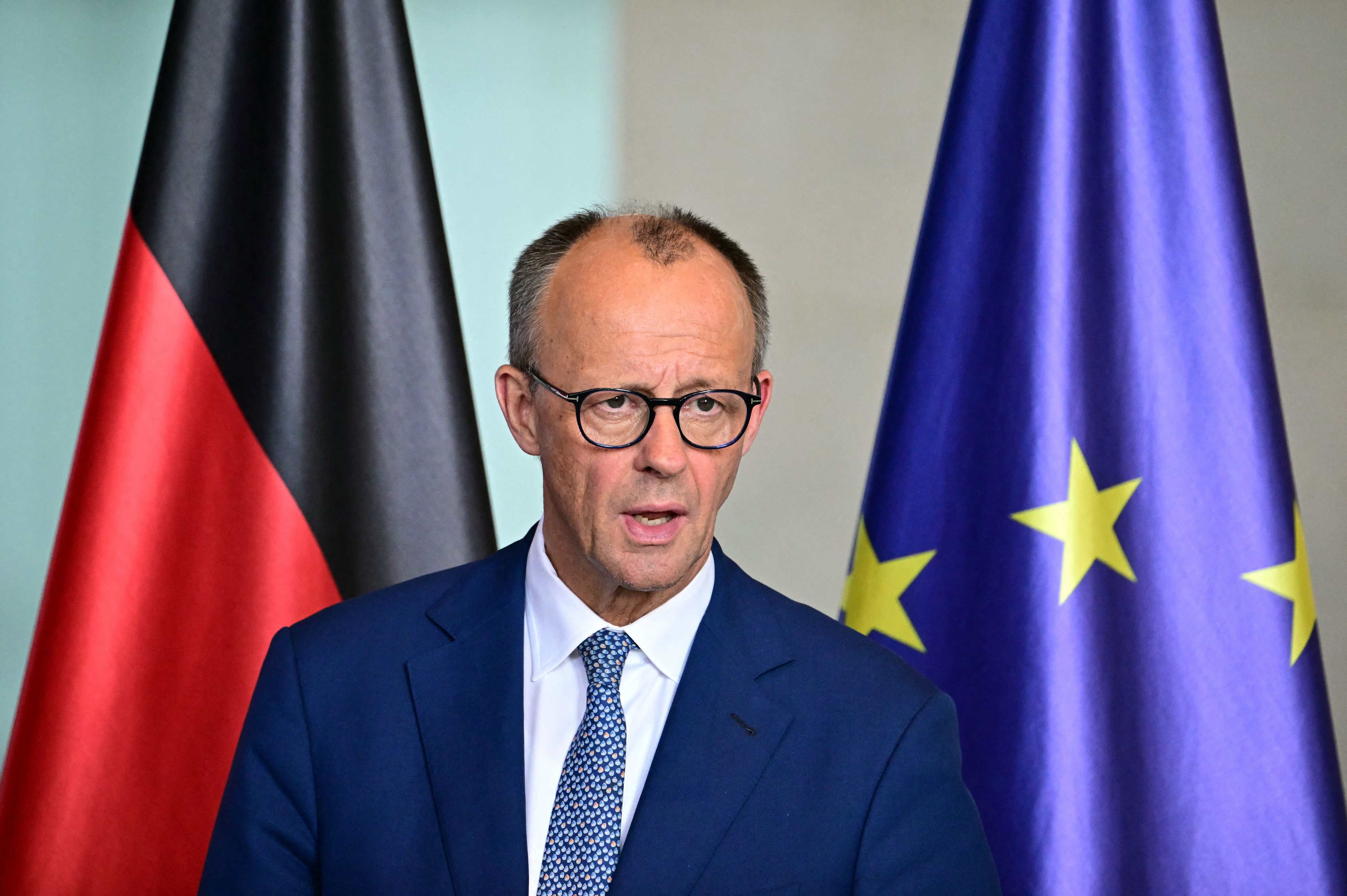
In a statement Friday morning , German Chancellor Friedrich Merz called on both sides to “refrain from steps that could lead to further escalation and destabilize the entire region.”
“Germany stands ready to use all diplomatic means at our disposal to influence the parties to the conflict. The goal must remain that Iran does not develop nuclear weapons,” Merz said.
Pointing also to the latest findings of the International Atomic Energy Agency (IAEA) that Iran is failing to meet nuclear obligations , Merz said the German government has “repeatedly expressed its concern about Iran’s advanced nuclear weapons program for many years.”
“We reaffirm that Israel has the right to defend its existence and the security of its citizens,” Merz said. The chancellor said Israeli Prime Minister Benjamin Netanyahu informed him by phone Friday about the military actions and their objectives.
“We have agreed in the Security Cabinet to take all necessary precautions to protect German citizens in Israel, Iran, and the region,” Merz said, adding that security authorities in Germany will also increase protection of Jewish and Israeli institutions.
Israeli Foreign Minister Gideon Saar also said Friday he spoke to his German counterpart, Johann Wadephul, saying Israel’s decision to strike was made “at the last possible minute.”
“We know that challenging days lie ahead, but we have no other choice,” Saar said.
By: Kate Brady and Alon Rom
7:30 AM: Analysis from Victoria Bisset, Breaking news, international news
Iran considers Israel’s attacks to be a “declaration of war,” Iranian Foreign Minster Abbas Araghchi said in a letter addressed to the United Nations and shared on his Telegram channel .
Araghchi described the attacks as “a gross violation of Iran’s sovereignty and territorial integrity” and called for an emergency session of the U.N. Security Council.
7:14 AM: Analysis from Lior Soroka
Israel’s air force “continues to strike in Iran,” Israeli military spokesperson Effie Defrin said in a statement. Defrin said “most” of the drones launched by Iran were intercepted. He also said Israeli attacks have “significantly damaged” Iran’s Natanz nuclear facility. “We have objectives for the war, and we will continue to act toward those objectives until they are achieved,” Defrin said, adding: “We are preparing for a prolonged operation.”
7:07 AM: Trump warns Iran to ‘make a deal’ in Truth Social post

President Donald Trump is warning Iran that it needs to “make a deal” with the United States as “already planned attacks” could be “even more brutal.”
In a Friday morning post on Truth Social , Trump said he gave Iranian leaders “chance after chance” to come to an agreement, but “they just couldn’t get it done.” The U.S. has been holding talks with Iran over its nuclear program that appear to have hit an impasse . Iranian officials say the right to enrich uranium domestically is a red line for Tehran; the Trump administration wants to limit this capability.
In Friday’s post, Trump said he told Iran that the U.S. “makes the best and most lethal military equipment anywhere in the World, BY FAR, and that Israel has a lot of it, with much more to come — And they know how to use it.”
“Certain Iranian hardliner’s spoke bravely, but they didn’t know what was about to happen. They are all DEAD now, and it will only get worse!” his post said.
On Wednesday, the U.S. said it was drawing down military and diplomatic personnel across the Middle East in anticipation of a strike in Iran. On Thursday, Trump said he did not want Israel “going in because I think that would blow it. Might help it actually, but it also could blow it.”
By: Victoria Craw
7:00 AM: Middle Eastern countries criticize Israeli attacks
Several Middle Eastern countries condemned the overnight Israeli attacks on Iran. Regional heavyweights Saudi Arabia and Turkey both denounced the attacks, with the Saudi foreign minister telling his Iranian counterpart that it “hinders efforts aimed at de-escalation and reaching diplomatic solutions.”
The United Arab Emirates, the first Persian Gulf country to normalize relations with Israel, urged all parties to exercise maximum restraint “to avoid risks and the expansion of the conflict.”
Qatar and Oman, both key mediator countries, called on the international community to exert pressure on Israel to halt its attacks.
In Lebanon, which is still recovering from the recent war between Israel and Hezbollah, the country’s president, Joseph Aoun, said the strikes “targeted all international efforts exerted to maintain stability in the Middle East.”
The countries did not comment on reports that Tehran had launched drones in retaliation for the attacks.
By: Mohamad El Chamaa
7:00 AM: Russia strongly condemns Israel’s ‘atrocities’ against Iran
Russia’s Foreign Ministry on Friday strongly condemned Israel’s overnight strikes on Iran’s nuclear program and other military targets, in a shift from President Vladimir Putin’s policy of largely balancing its partnerships in the Middle East.
Russia has aligned more closely with Iran since its invasion of Ukraine, when it received drones and missiles from Iran, but has maintained ties with Israel. Friday’s statement adopted a more strident tone toward Israel, describing the strikes as “atrocities.”
Russia had earlier offered to help the Trump administration’s diplomatic efforts with Iran, led by President Donald Trump’s envoy Steve Witkoff, designed to prevent Iran from gaining a nuclear weapon.
The ministry said Israel’s actions were “categorically unacceptable” and a “dangerous escalation of tension” that was a “violation of the charter of the United Nations and the norms of international law.”
“We express our extreme concern about the dangerous escalation of tension in the Middle East. We strongly condemn the forceful action of the State of Israel in violation of the Charter of the United Nations and the norms of international law on the night of June 13,” the statement said.
“Unprovoked military strikes against a sovereign U.N. member state, its citizens, sleeping peaceful cities, nuclear energy infrastructure facilities are categorically unacceptable. The international community cannot afford to be indifferent to such atrocities, which destroy the world and damage regional and international security.”
The ministry said there was “no military and violent solution” to the resolution of Iran’s nuclear program.
Russian analysts predicted that Moscow would benefit from the crisis, with higher oil prices helping to fuel the war against Ukraine, and global attention directed away from Russia’s war.
By: Robyn Dixon
6:51 AM: Analysis from Mohamad El Chamaa
Iranian Supreme Leader Ali Khamenei has made a slew of appointments to replace commanders killed in Israeli airstrikes. Khamenei announced through his official X account that Maj. Gen. Mohammad Pakpour will succeed Hossein Salami as commander of the Islamic Revolutionary Guard Corps and that Maj. Gen. Abdolrahim Mousavi will succeed Mohammad Bagheri as chief of staff of the army. Ali Shadmani was promoted to major general and was charged with leading a major command unit after the death of Gholam Ali Rashid.
6:43 AM: Flights canceled, disrupted as airspace closed across Middle East
Flights across the Middle East have been canceled, redirected or returned to their point of origin after Israel’s strike on Iran on Friday morning.
Airspace was closed over Israel, Jordan, Iraq and Iran, according to authorities and state media reports. Tracking data from Flight Radar 24 showed planes clearing the area.
The Israel Airports Authority said Ben Gurion Airport in Tel Aviv is closed until further notice. In Abu Dhabi, Zayed International Airport warned passengers to expect disruption in a post on X . Dubai Airports said some flights from Dubai International Airport and Al Maktoum International Airport were also subject to cancellations or delays .
Carriers affected include Qatar Airways, which said it had temporarily canceled flights to Iran and Iraq “due to current situation in the region” in a post on X . Air India also said several flights had been diverted or returned to their place of origin “in view of the safety of our passengers.” Israeli airline El Al said it would suspend flights to and from Israel. Lufthansa Group, which covers flights operated by Lufthansa, Swiss, Austrian Airlines, Eurowings, ITA Airways and Brussels Airlines said in a statement that it would suspend flights to Tel Aviv, Tehran, Amman, Erbil and Beirut. Etihad and Syrian airlines also announced delays and canceled or redirected flights, according to the Associated Press .
By: Victoria Craw
6:30 AM: Analysis from Victoria Bisset, Breaking news, international news
The remnants of two Iranian missiles fell in the southwestern Syrian province of Daraa without causing any damage or casualties, the state-run Syrian Arab News Agency (SANA) reported Friday , citing a correspondent. According to SANA, the missiles were flying through Syrian airspace. Earlier on Friday, an Israeli military spokesperson said Iran had launched more than 100 drones toward Israel.
6:12 AM: Analysis from Mohamad El Chamaa
Iran’s semiofficial Mehr News Agency reported another wave of Israeli airstrikes near Tabriz airport in northern Iran. Video shared by the agency showed plumes of smoke rising over the city.
6:09 AM: Key nuclear sites not impacted, Iran tells U.N. atomic agency
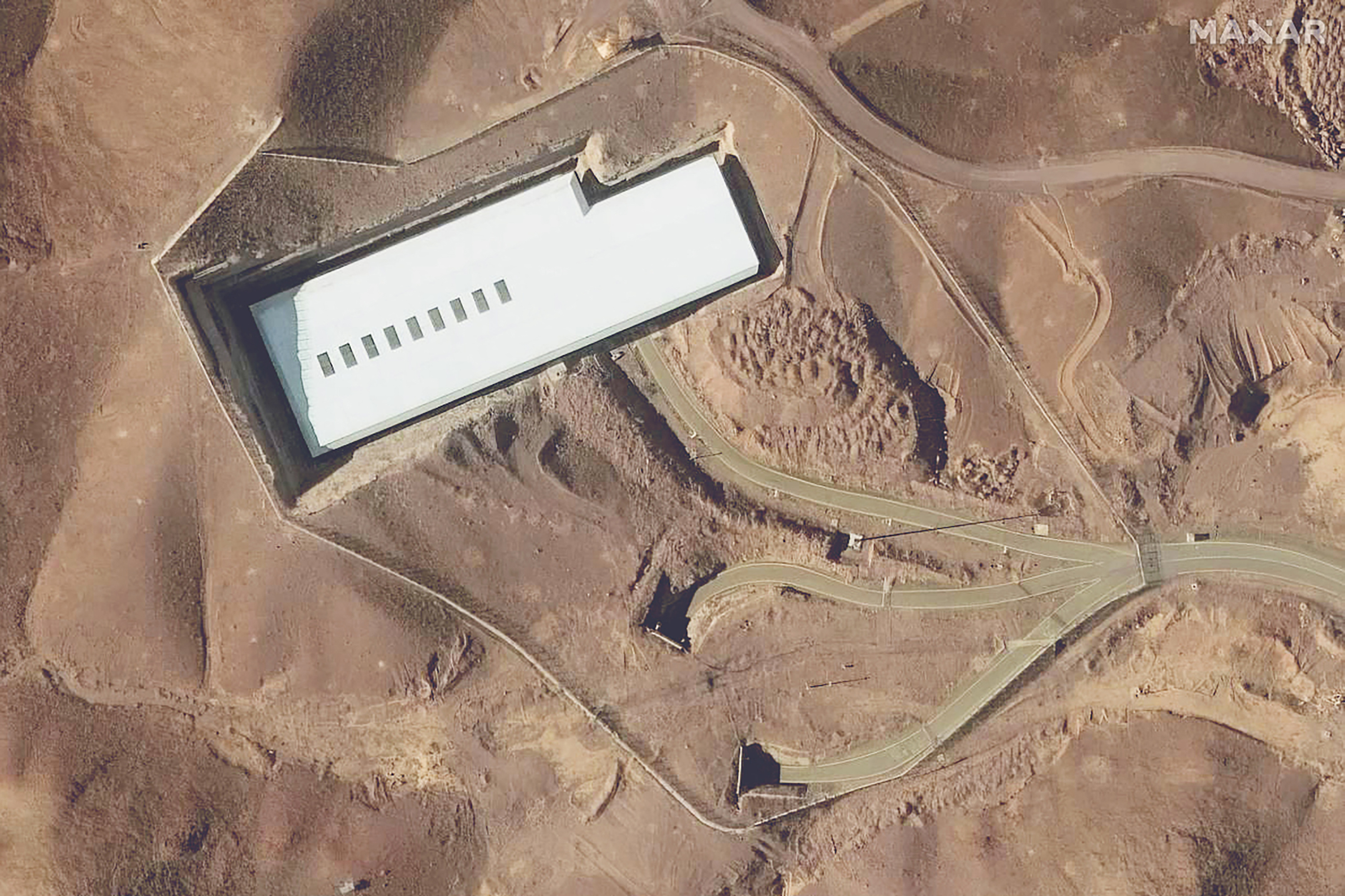
At least three significant nuclear sites in Iran were not hit by Friday’s strikes, Iranian authorities told the International Atomic Energy Agency. The Fordow fuel enrichment plant, the nuclear research site at Isfahan and the Bushehr nuclear power plant were not impacted, IAEA Director General Rafael Grossi said in social media posts.
The agency had earlier said Natanz, where Iran’s largest nuclear enrichment facility is located, had been targeted, citing Iranian officials. It later added that no increase in radiation levels had been observed there in the following hours, though did not comment on the extent of damage to the facility.
The Fordow fuel enrichment plant is the second site in Iran where nuclear enrichment work is known to occur. The underground facility is built inside a mountain in north-central Iran, a subterranean setting that makes it nearly invulnerable to airstrikes.
Isfahan contains the country’s largest nuclear research complex, which employs about 3,000 scientists, according to the nonprofit Nuclear Threat Initiative. The province was the target of Israeli airstrikes against Iran in April 2024, which were intercepted.
Bushehr is the site of Iran’s sole operating nuclear power plant, which generates about 1 percent of the country’s electricity.
By: Frances Vinall
5:47 AM: Analysis from Mohamad El Chamaa
United Nations Secretary General António Guterres called for “maximum restraint” from both sides, saying a deeper conflict was “a situation that the region can hardly afford,” according to a statement from his spokesperson .
“He is particularly concerned by Israeli attacks on nuclear installations in Iran while talks between Iran and the United States on the status of Iran’s nuclear programme are underway,” the statement added.
5:30 AM: Before strikes, U.N. watchdog said Iran not complying with nuclear obligations
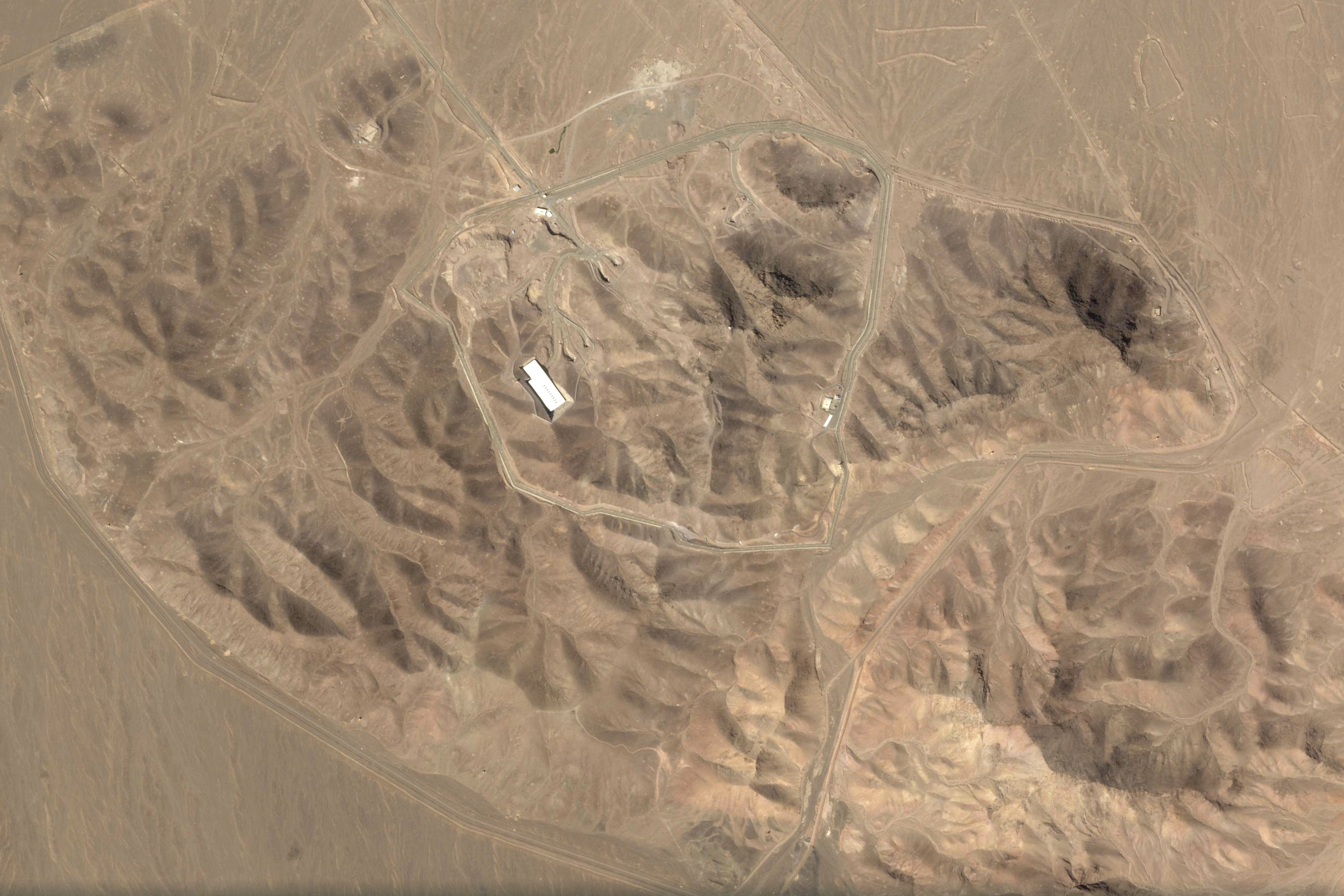
DUBAI — The United Nations’ nuclear watchdog Thursday declared Iran in breach of its nonproliferation obligations for the first time in 20 years, according to a copy of the resolution adopted by the agency’s board of governors and seen by The Washington Post.
The resolution, from the International Atomic Energy Agency (IAEA), cited “undeclared nuclear material and activities” discovered by agency inspectors at three sites a number of years ago that Iran has never explained. On Monday, IAEA Director General Rafael Grossi told the 35-nation board that “Iran has repeatedly either not answered” IAEA requests “or not provided technically credible answers,” adding that, “Unless and until Iran assists the agency in resolving the outstanding safeguards issues, the agency will not be in a position to provide assurance that Iran’s nuclear program is exclusively peaceful.”
Read the full story
By: Susannah George and Karen DeYoung
5:15 AM: Analysis from Victoria Bisset, Breaking news, international news
The Atomic Energy Organization of Iran said Friday that the Israeli attacks damaged the Natanz nuclear facility in the center of the country.
In a statement shared by Iranian media , the organization said it was assessing the extent of the damage but added that there have been no reports of casualties or radioactive or chemical contamination at the site.
4:58 AM: Israeli attacks deal withering blow to Iran’s military leadership
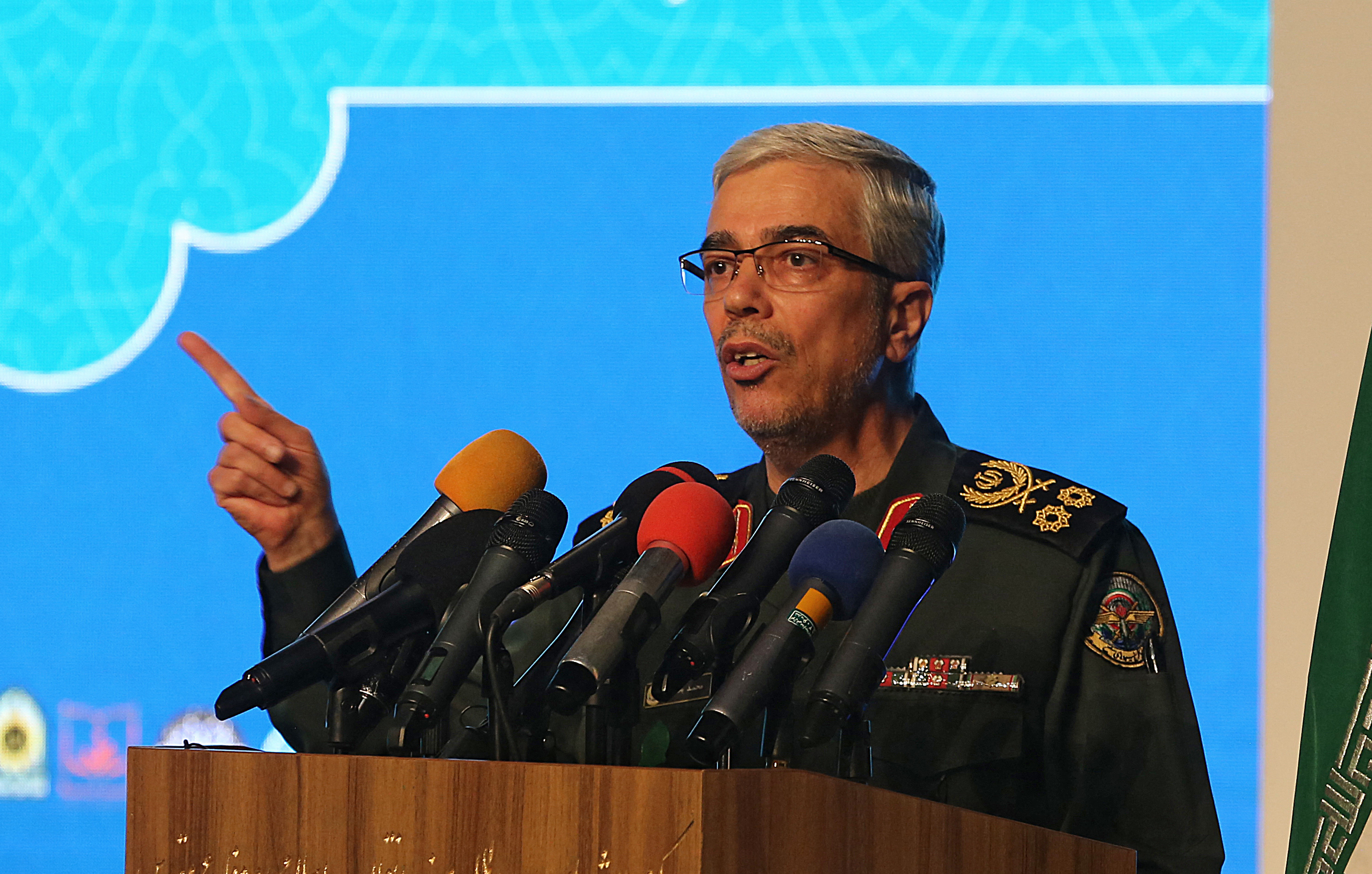
Israel’s attacks on Iran early Friday dealt a severe blow to Tehran’s military leadership, killing three senior commanders including the army’s chief of staff and the head of the powerful Islamic Revolutionary Guard Corps, or IRGC.
Maj. Gen. Mohammad Bagheri, the army chief of staff and a veteran of the IRGC, reported directly to the supreme leader, Ayatollah Ali Khamenei.
Maj. Gen. Hossein Salami, as commander of the Revolutionary Guard, presided over an elite, sprawling organization founded in parallel to Iran’s military that includes the Quds Force, which trains and directs Iranian overseas proxy forces, and the Basij militia, focused on enforcing domestic security.
The attacks also killed Maj. Gen. Gholam Ali Rashid, who was responsible for coordinating operations among Iran’s military forces, Iran’s state broadcaster announced.
Analysts said that as Iran prepared its retaliation for the attack, the killings of the military leaders could shape its response.
The deaths may “greatly hinder Iran’s ability to make decisions and coordinate a response, similar to what happened recently in Lebanon, when Israel killed most of Hezbollah’s top leadership,” the Eurasia Group, a political risk consulting firm, said in an analysis Friday, referring to Israel’s strikes on commanders and leaders of the Lebanese militant group, including Hasan Nasrallah, Hezbollah’s leader.
Friday’s attacks could also be “forcing a generational turnover in IRGC leadership,” Afshon Ostovar, author of “Wars of Ambition: The United States, Iran, and the Struggle for the Middle East,” wrote in a post on X.
“The ruling generation has been ideologically inflexible but also bore the scars of the Iran-Iraq war. That made them wary of direct, open conflict. The incoming generation might not be as cautious,” he wrote.
By: Kareem Fahim
4:34 AM: Mossad activated drones already hidden in Iran, Israeli official says
At least several months ago, Israel’s top spy agency, the Mossad, began to smuggle missiles into Iran and secretly installed swarms of explosive drones deep inside the country, laying the groundwork for a devastating Israeli surprise attack on Friday morning. As Israel launched its air attack, the Mossad activated its planted drones, which struck missile launchers at a base near Tehran, a senior Israeli official said, speaking on the condition of anonymity to discuss intelligence operations.
Two people with knowledge of the operation described the explosive drone plot as similar to the Ukrainian operation that destroyed Russian strategic bombers this month but said there was no coordination between Israel and Ukraine.
Mossad commando units had also deployed before Friday to install precision-guided weapons near Iranian air defense systems that were also activated Friday morning and completely took out Iranian defenses, a senior Israeli official said.
By: Gerry Shih, Ilan Ben Zion and Lior Soroka
4:13 AM: Analysis from Victoria Bisset, Breaking news, international news
Israel’s military says it has finished its “large-scale strike” against Iran’s air defenses in the west of the country.
“As part of the strikes, dozens of radars and surface-to-air missile launchers were destroyed,” the Israel Defense Forces wrote on Telegram .
3:59 AM: What happened the last time Iran struck Israel
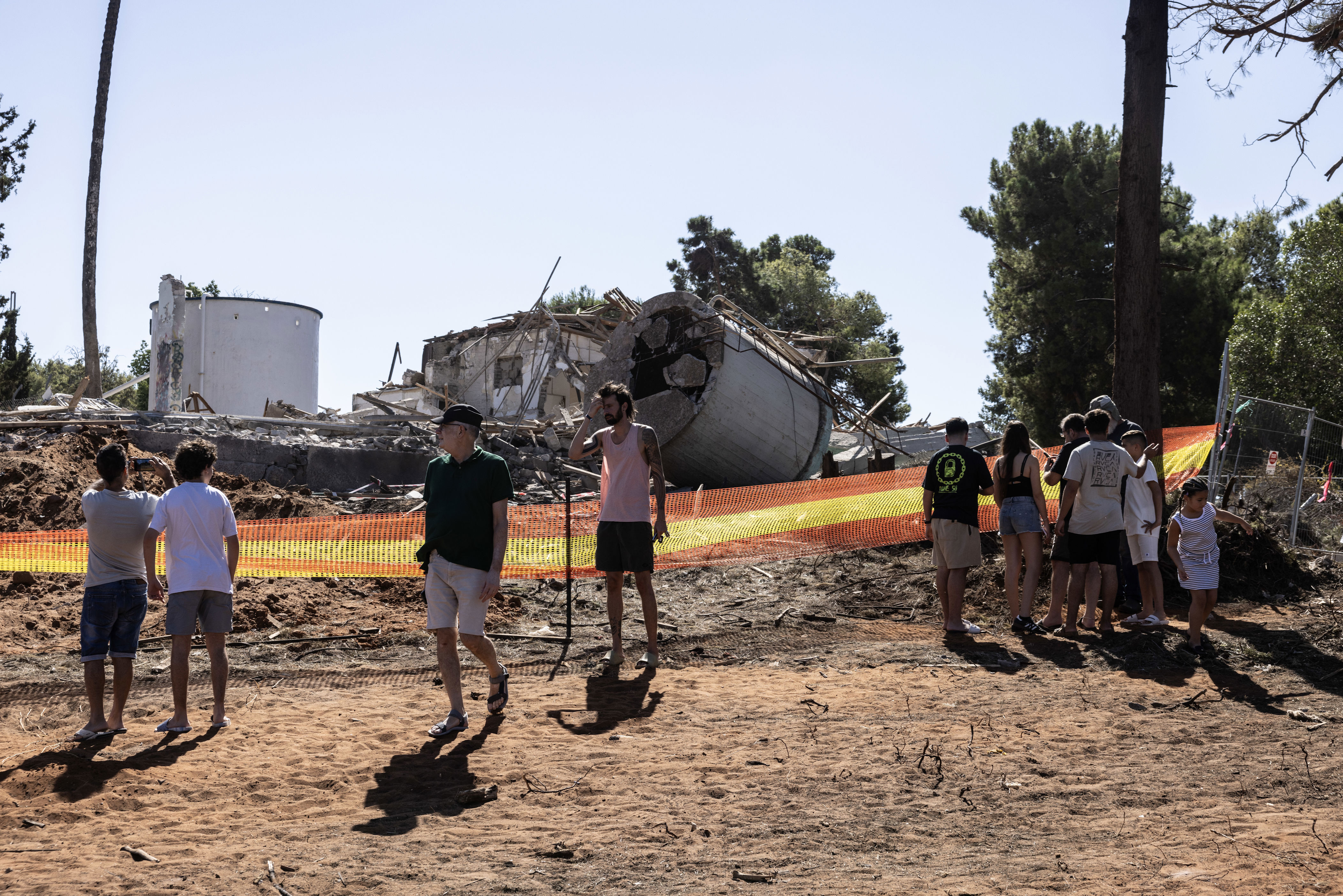
Israel was on alert for Iranian retaliation after the Israeli military on Friday struck sites including the capital, Tehran. Iran has attacked Israel directly twice during the current conflict in the Middle East. It fired a barrage of ballistic missiles in October in what it said was retaliation for the assassinations of Hasan Nasrallah, the leader of the Iranian-backed Hezbollah militant group, in Beirut and Hamas chief Ismail Haniyeh in Tehran. Iran also launched a wave of missiles and drones in April last year after Israel struck its diplomatic compound in Syria.
The strikes provided unprecedented windows into the extent of Iran’s capabilities and to Israel’s ability to intercept or withstand them. Some experts said the insights call into question the value of Tehran’s enormous missile arsenal, which U.S. officials have estimated to be the largest in the Middle East.
Read the full story
By: Adam Taylor, Meg Kelly and Frances Vinall
3:32 AM: Analysis from Mohamad El Chamaa
Iran’s semiofficial Tasnim News Agency, citing the head of the local crisis management unit, reported that Israeli strikes on the northern city of Tabriz have so far resulted in a toll of two dead and six injured.
3:01 AM: Israel begins intercepting Iranian-launched drones, military official says
Israel on Friday morning began intercepting Iranian-launched drones outside Israeli territory, according to an Israeli military official.
A person familiar with the event — who, like the official, spoke on the condition of anonymity to discuss the ongoing operation — confirmed that the interceptions were taking place in Saudi Arabian, Syrian and Jordanian airspace.
Local media reports said drones that had not been intercepted were expected to arrive in Israel within the next two hours.
By: Shira Rubin
2:42 AM: Analysis from Heidi Levine
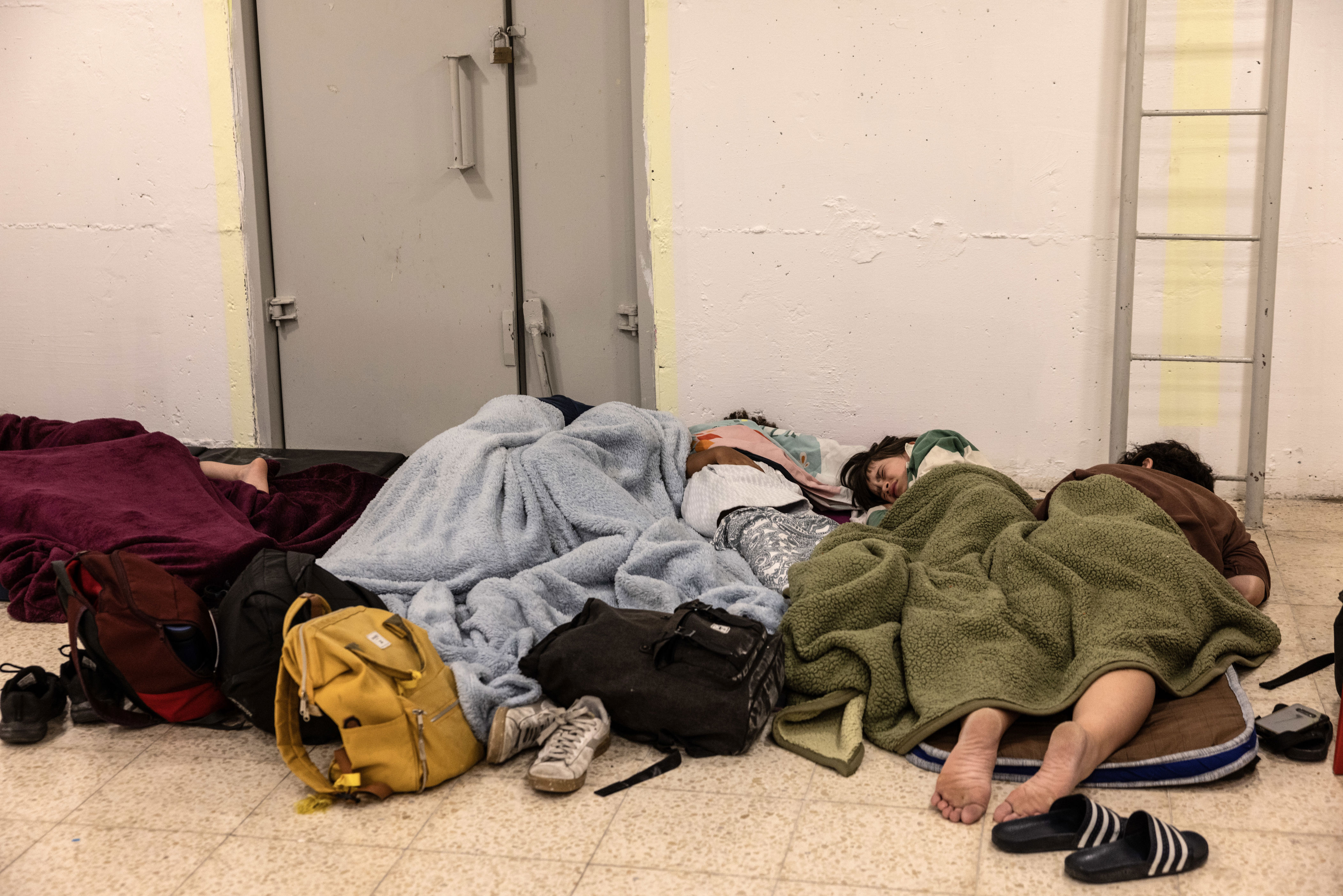
A family sleeps in a public underground shelter in Tel Aviv on Friday in the early morning. Israel is bracing for retaliation after it launched strikes on Iran’s nuclear program and other military targets.
2:23 AM: Analysis from Mohamad El Chamaa
In separate statements, Hamas and Palestinian Islamic Jihad condemned the Israeli strikes on Iran and offered their condolences to the country’s leadership for the deaths of military officers and nuclear scientists in the attacks.
2:21 AM: Analysis from Frances Vinall
President Donald Trump told Fox News chief political anchor Bret Baier that he was aware of Israel’s strikes before they happened, the network reported . Trump said he hoped negotiations with Iran would continue, but “there are several people in leadership that will not be coming back.”
2:14 AM: Analysis from Lior Soroka
Despite international media reports about Israel’s readiness to strike Iran, Israel managed to keep the exact timing secret. Several stories in Israeli media indicated that Israel was not planning to carry out an attack before the beginning of next week, and that Prime Minister Benjamin Netanyahu was planning a weekend vacation ahead of his son’s wedding, scheduled for Monday.
1:27 AM: U.S. Embassy in Israel issues shelter-in-place directive
The U.S. Embassy in Jerusalem on Friday issued a directive to all U.S. government employees and their family members to shelter in place until further notice.
It said U.S. citizens in Israel should be aware of the location of the nearest shelter and be aware that “security incidents, including mortar, rocket, and missile fire, and unmanned aircraft system (UAS) intrusions, often take place without any warning.”
Earlier this week, The Washington Post reported that the State Department authorized the evacuation of some personnel in Iraq and the Pentagon green-lit the departure of military family members across the Middle East in anticipation of a possible Israeli strike on Iran.
By: Frances Vinall
1:18 AM: Iran launches more than 100 drones in retaliation for Israeli strikes, IDF says
Israel Defense Forces spokesperson Effie Defrin said Friday morning in a statement that Iran had launched “over 100 UAVs toward Israel, and the IDF is working to intercept them.”
He said more than 200 Israeli air force fighter jets had struck over 100 targets across Iran, including the locations of top Iranian military officials, and that the strikes were ongoing.
Defrin confirmed the deaths of Maj. Gen. Hossein Salami, the commander of Iran’s Islamic Revolutionary Guard Corps; Maj. Gen. Gholam Ali Rashid, a senior IRGC commander; and Maj. Gen. Mohammad Bagheri, chief of staff of the armed forces, in the strikes. The killings were previously reported by Iranian state media.
By: Lior Soroka
12:53 AM: Iranian news agency confirms deaths of military commanders, nuclear scientists
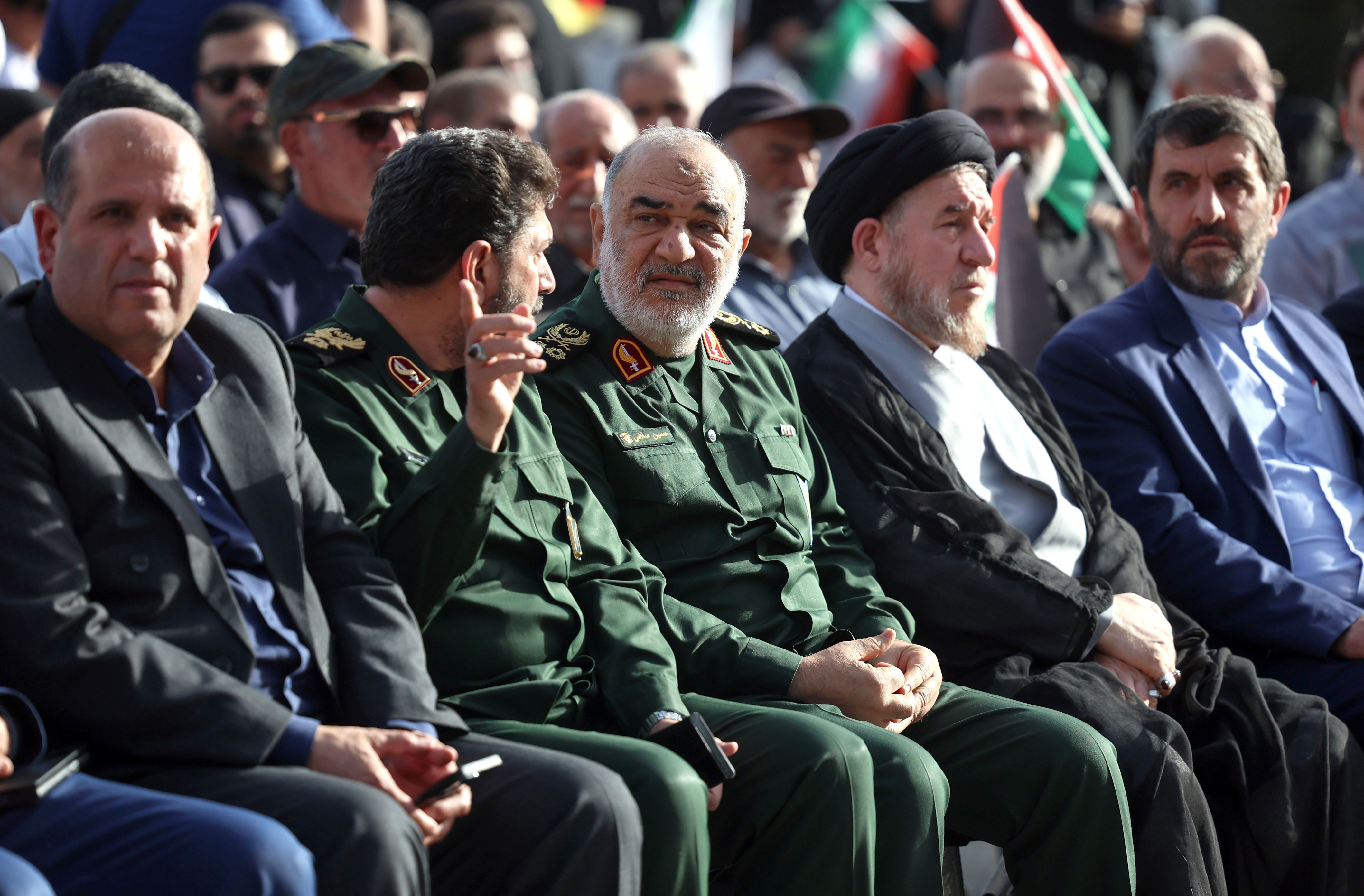
Iran’s semiofficial Tasnim News Agency confirmed the deaths of prominent military commanders and nuclear scientists in Israel’s strikes.
It reported that Maj. Gen. Hossein Salami, commander of the Islamic Revolutionary Guard Corps, was killed, along with another senior IRGC commander, Maj. Gen. Gholam Ali Rashid.
The agency also reported the deaths of Mohammad Mehdi Tehranchi and Fereydoon Abbasi, whom the agency identified as “two prominent Iranian nuclear scientists.”
Mehr News Agency Arabic, another semiofficial Iranian agency, reported that Maj. Gen. Mohammad Bagheri, chief of staff of the armed forces, was also killed in the strikes.
By: Mohamad El Chamaa
12:15 AM: Iranian nuclear site deep underground may be key to Israel’s success
Israel’s military struck a dizzying array of targets in Iran on Friday, in a long-planned strike apparently aimed both at decapitating the leaders of Iran’s military and nuclear programs and neutralizing what Israel sees as an existential threat.
But the fate of one of Iran’s most important sites for enriching uranium — the facility at Fordow , buried deep underground — remains unclear. Hidden by Iran in a mountain near the holy city of Qom until it was discovered by Western intelligence agencies in 2009, the facility is seen as a key node in Tehran’s nuclear infrastructure and one of the hardest to dismantle.
Current and former U.S. officials have said that Israel would need both U.S.-supplied earth-penetrating munitions and in-air refueling for its fighter aircraft to disable the thousands of centrifuges enriching uranium at Fordow. If the facility is not eliminated, they said, the setback to Iran’s nuclear program is likely to prove temporary.
By: Warren P. Strobel
12:14 AM: Images appear to show extensive damage to building in northern Tehran
Videos and photos verified by The Washington Post appeared to show extensive damage to the top of a landmark tower near Vanak Square in northern Tehran. In one video filmed at night, smoke can be seen coming from the top of One Holding Tower. Photos taken the following morning show numerous glass windows blown out.
By: Evan Hill
11:50 PM: IAEA says Natanz nuclear facility among Israel’s targets
The International Atomic Energy Agency is “closely monitoring” the situation in Iran, the nuclear watchdog’s director general, Rafael Mariano Grossi, said in a statement. He said the Natanz nuclear facility in central Iran was among the targets of Israel’s strikes.
“The Agency is in contact with Iranian authorities regarding radiation levels. We are also in contact with our inspectors in the country,” Grossi said.
Iran’s semiofficial Mehr News Agency earlier shared video that it said showed smoke billowing from the Natanz facility.
Earlier on Thursday, the IAEA’s Board of Governors adopted a resolution declaring that Iran was in breach of its nuclear nonproliferation obligations for the first time in 20 years. Tehran condemned the resolution, calling it politically motivated, and announced plans to open a new uranium enrichment site.
By: Erin Cunningham and Mohamad El Chamaa
11:48 PM: Photos and videos show damage in Tehran neighborhood
Firefighters work at the scene of an explosion at a residential compound in northern Tehran on Friday.
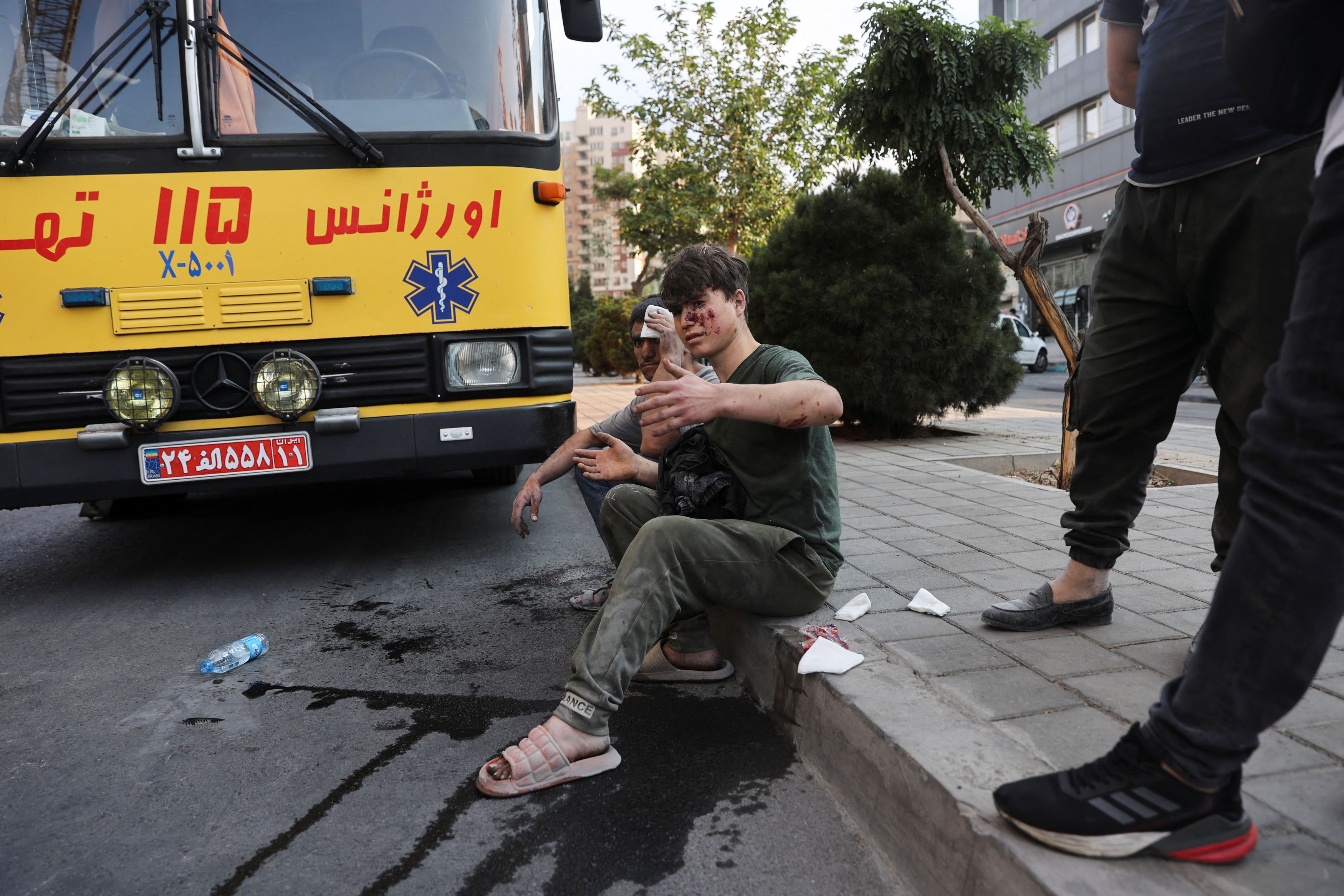
An injured person sits on the roadside in the aftermath of Israeli strikes.
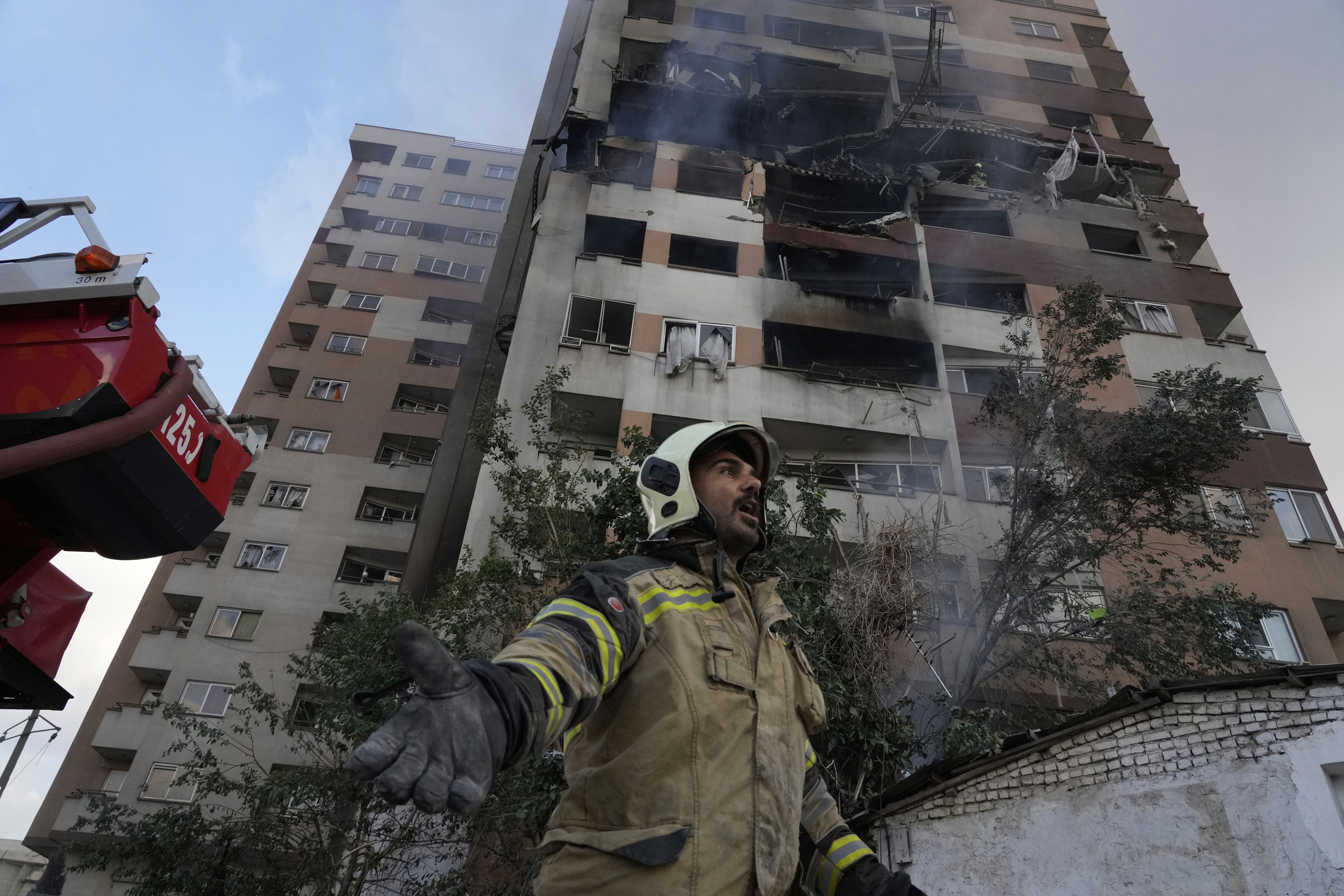
A firefighter calls out to colleagues at the scene of an explosion at a residential compound in northern Tehran.
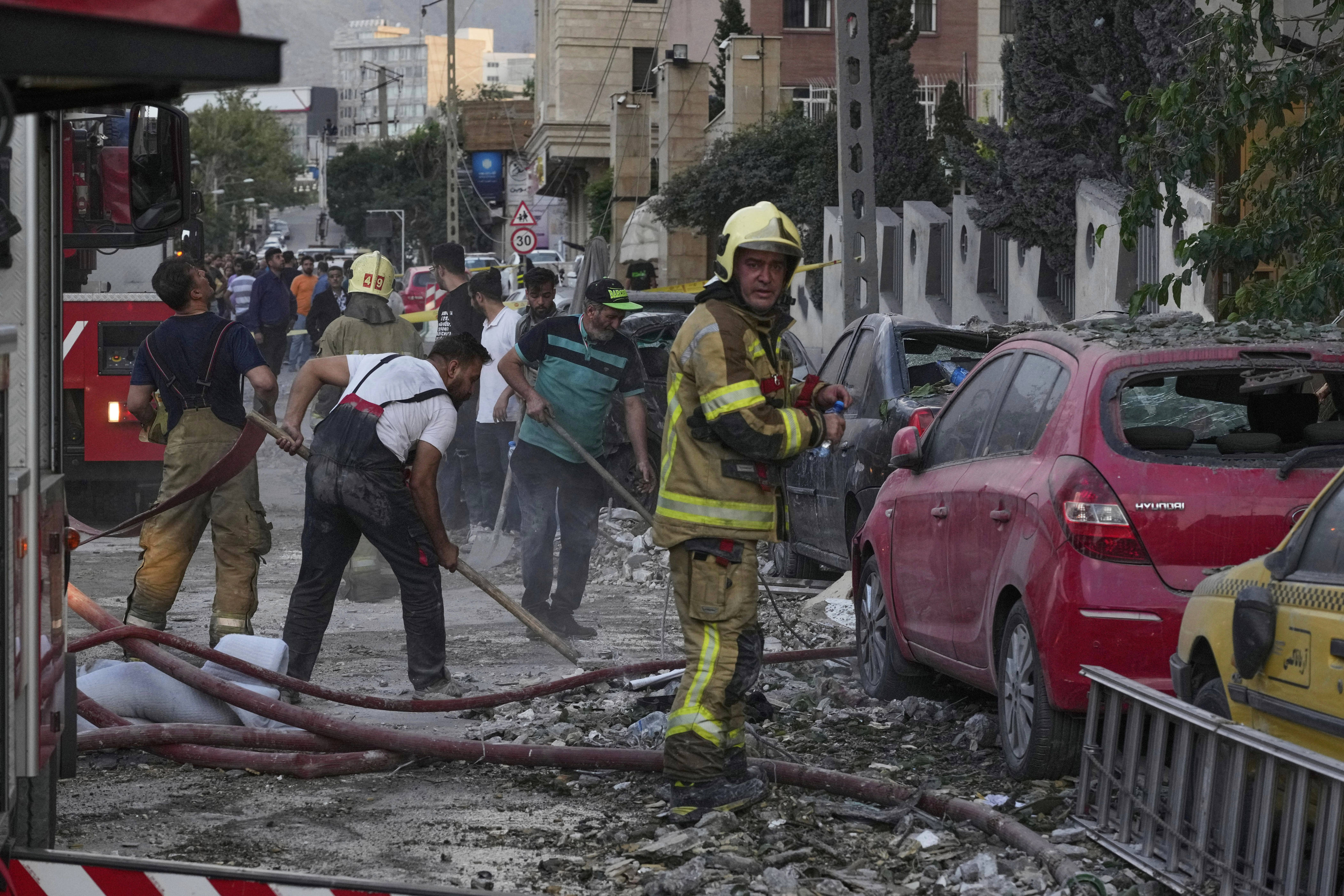
Firefighters and others clean up the scene of an explosion.
By: Washington Post staff
11:42 PM: Israel and U.S. must pay ‘heavy price’ for attacks, Iranian military spokesman says
The spokesman for Iran’s armed forces, Abolfazl Shekarchi, said on Iranian television that Israel and the United States “must pay a very heavy price, and they will, God willing, receive a very forceful slap” for the Israeli strikes on Iran.
“The Zionist enemy, with the support and likely direct aid of the United States, took this painful action, which unfortunately targeted many residential areas in the country,” he said.
Shekarchi added that the homes of some officials and military commanders had been targeted, and that some of them had died.
“The armed forces are on the job, and everyone is ready,” he said.
By: Yeganeh Torbati
10:51 PM: Analysis from Alon Rom
Israeli Defense Minister Israel Katz told the Israel Defense Forces General Staff Forum before the strikes began that he had “defined the thwarting of Iran’s nuclear program as my top priority” since taking office late last year. “Over the past year and a half, we’ve dealt with Iran’s proxies,” he said, a reference to militant groups Hamas in Gaza, Hezbollah in Lebanon and the Houthis in Yemen. “Now, we are dealing with the snake’s head itself.”
10:41 PM: Analysis from Michael Birnbaum, White House correspondent covering the Trump presidency and foreign policy
President Donald Trump will convene his top security officials for a meeting of the U.S. National Security Council in the Situation Room at 11 a.m. Eastern time on Friday, the White House said late Thursday.
10:24 PM: Analysis from Alon Rom
Tel Aviv, Israel’s commercial capital, was busy preparing for its annual Pride parade, with clubs and bars packed early on Friday, when sirens sounded across the city and a message from the Home Front Command announced the start of the attack on Iran. The bars immediately shut down and Friday’s parade was canceled.
10:22 PM: Analysis from Adam Taylor, National Security reporter with a focus on the State Department
Israel’s national airline, El Al, said it was suspending flights to and from the country due to “recent security developments” and the closure of Israeli airspace. El Al has largely kept flying despite recent conflicts in the region.
10:18 PM: Analysis from Washington Post staff
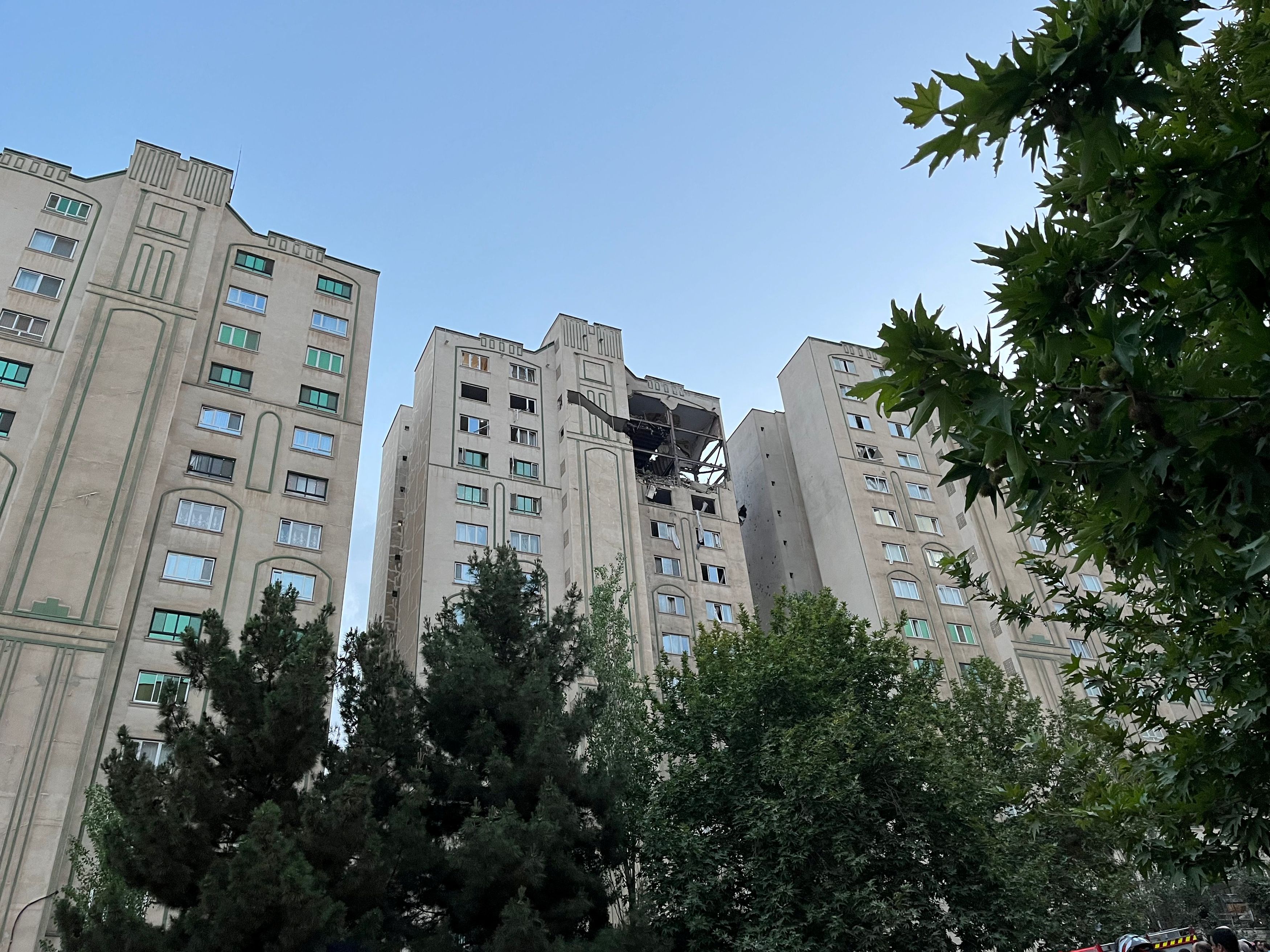
Damage to a building in Tehran following Israeli strikes early Friday.
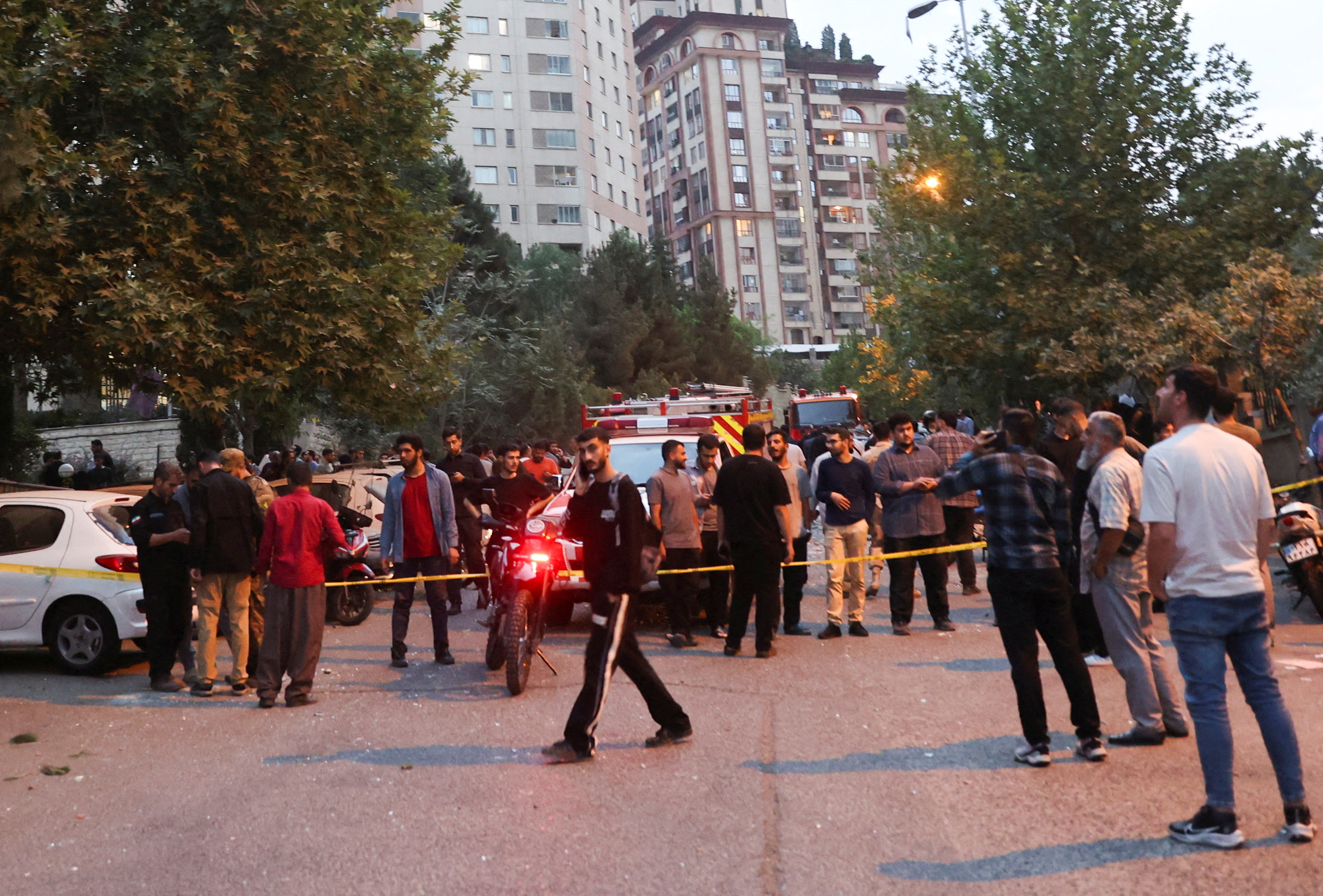
People gather in the street in Tehran early Friday in the aftermath of Israeli strikes.
10:01 PM: Analysis from Susannah George, The Persian Gulf
Iran’s Press TV aired initial reports that the Israeli strikes in and around Tehran have resulted in civilian casualties. The state-run broadcaster said the Israeli attacks also struck sites in Natanz, where Iran has a nuclear site, and in Khorramabad, in western Iran, home to a large missile base.
10:01 PM: Analysis from Mustafa Salim, Foreign reporter focusing on Iraq
The sounds of explosions and booms have been heard in the skies over Baghdad and several Iraqi provinces. An Iraqi security official, who spoke on the condition of anonymity because he was not authorized to speak to the media, said the sounds were the result of Israeli aircraft breaching Iraqi airspace and launching missiles.
9:44 PM: Israel’s military says it struck dozens of targets in Iran
Israel’s military said that Israeli air force jets carried out strikes on dozens of Iranian military targets early Friday, in an effort to disrupt Iran’s nuclear program.
The Israel Defense Forces said in a statement that Iran is “closer than ever to obtaining a nuclear weapon,” which it said would be an “existential threat” to Israel, adding that it would “continue to act as required” against such threats.
“The IDF launched a preemptive, precise, combined offensive based on high-quality intelligence to strike Iran’s nuclear program, and in response to the Iranian regime’s ongoing aggression against Israel,” the IDF said.
Tehran had threatened to respond to an Israeli attack with counterstrikes targeting both Israel and U.S. forces, and facilities scattered throughout the Middle East.
The IDF said Friday it had “prepared for a wide range of scenarios in defense and offense that may be needed.”
Israeli Defense Minister Israel Katz earlier declared a “special emergency situation” in Israel in anticipation of a potential retaliatory attack.
By: Rachel Pannett
9:40 PM: Analysis from Yeganeh Torbati, Economic policy reporter
Mohammad, who lives near the Shahid Mahallati neighborhood in east Tehran, was at home when he heard a plane fly by at a very low altitude. He walked out to his terrace and saw what he said were 10 to 12 explosions in the area. Mohammad, who spoke on the condition that only his first name be used for security reasons, heard the sound of planes for about an hour after that.
9:33 PM: Netanyahu says Israel targeted Iran’s leading nuclear scientists
In a video statement released early Friday, Israeli Prime Minister Benjamin Netanyahu announced Operation “Rising Lion.”
“We struck at the heart of Iran’s nuclear enrichment program,” he said. “We struck at the heart of Iran’s nuclear weaponization program. We targeted Iran’s main enrichment facility in Natanz. We targeted Iran’s leading nuclear scientists working on the Iranian bomb. We also struck at the heart of Iran’s ballistic missile program.”
He said Israel was acting to protect its Arab neighbors, as well as the Western world and the United States, and thanked President Donald Trump — who has stated his preference for a negotiated deal — for his “leadership in confronting Iran’s nuclear weapons program.” But, Netanyahu said, “the hardest decision any leader has to make is to thwart a danger before it is fully materialized.”
By: Gerry Shih
9:24 PM: Analysis from Susannah George, The Persian Gulf
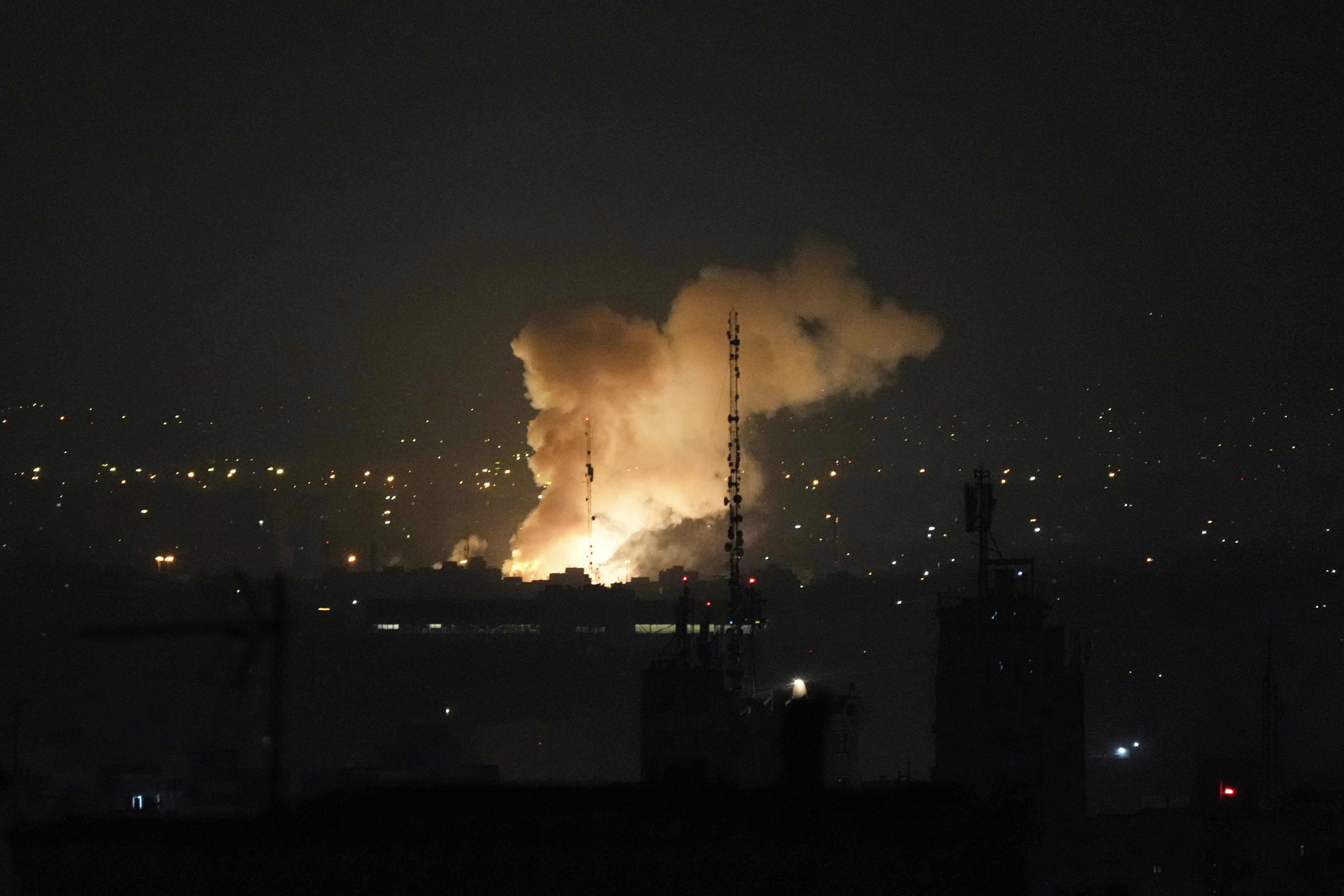
Explosions could be heard in the Iranian capital, Tehran, from about 3:20 a.m., according to a report by the Islamic Republic News Agency (IRNA), the state broadcaster.
The explosions could be heard in the city’s eastern, western and central neighborhoods, with reports that those in the east were the most intense, according to the IRNA. Images shared on social media and messaging applications showed flashes of light above the darkened skyline.
9:22 PM: Analysis from Janice Kai Chen
Israel’s military said its air force jets carried out strikes on dozens of Iranian military targets early Friday. See where they struck:
9:21 PM: Analysis from Lior Soroka
Israel Defense Forces spokesperson Effie Defrin said in a recorded statement that intelligence in recent months “has shown that Iran is closer than ever to obtaining a nuclear weapon.” He added that the IDF’s strikes targeted the Iranian nuclear program to prevent “the Iranian regime’s ability to build a nuclear bomb in the immediate time frame.”
9:16 PM: Analysis from Yeganeh Torbati, Economic policy reporter
Mahtab, a woman in northern Tehran, said she saw the sky turn red early Friday before she heard the sound of explosions. The windows of her home shook. She could hear planes flying overhead and the sirens of emergency vehicles blaring.
9:10 PM: Analysis from Washington Post staff
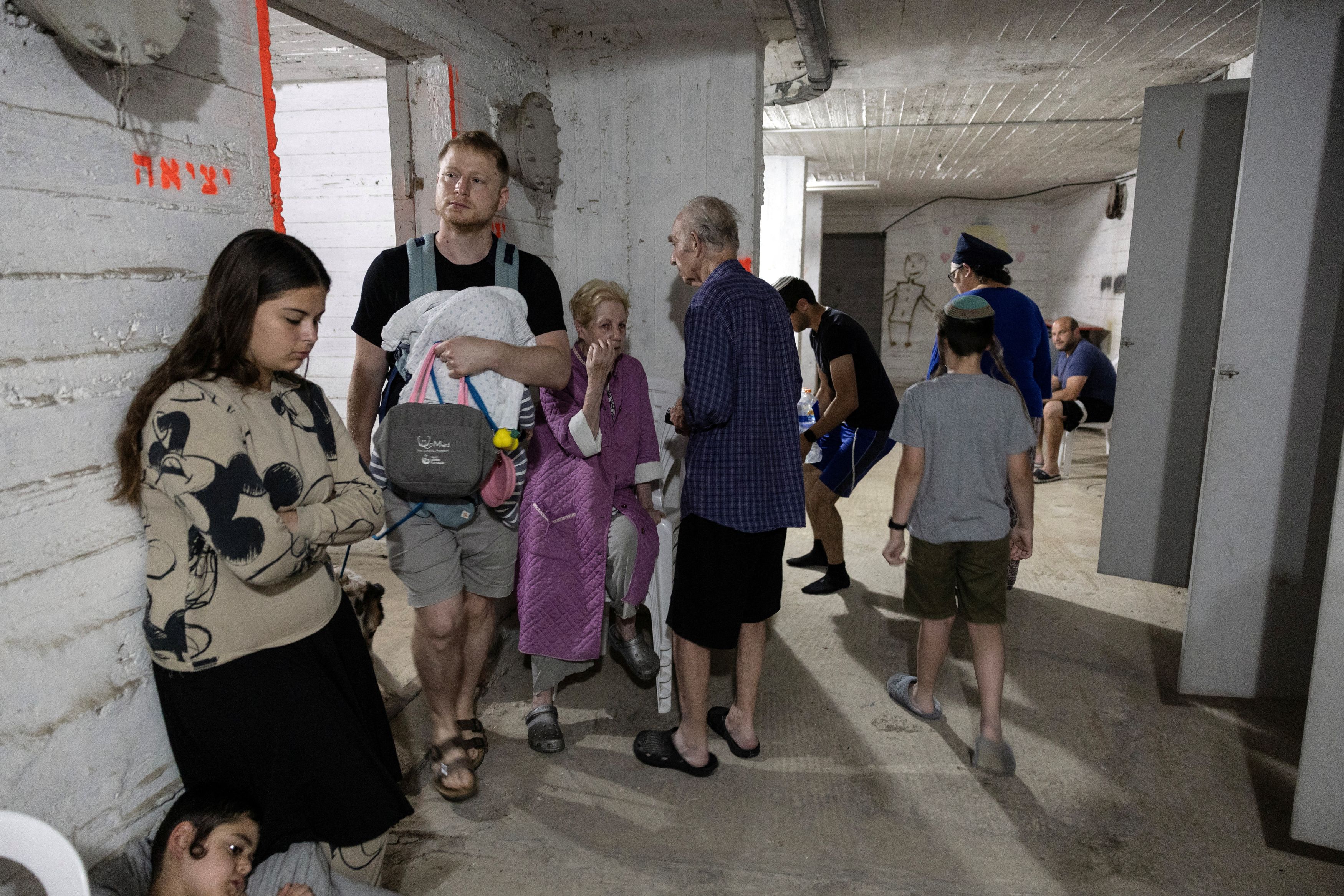
Israelis gather in a shelter following sirens in Tel Aviv early Friday.
9:01 PM: Analysis from Shira Rubin, Foreign reporter, Middle East
“This operation will continue for as many days as it takes to remove this threat,” Israeli Prime Minister Benjamin Netanyahu said early Friday in a video statement published in Hebrew and English. “This is a clear and present danger to Israel’s very survival,” he said, adding that Iran could “produce a nuclear weapon in a very short time. It could be a year. It could be a few months.”
9:00 PM: Rubio says U.S. forces not involved in Iran strikes, warns Iran not to target U.S.
Secretary of State Marco Rubio, in a statement distributed by the White House, confirmed the Israeli attacks against Iran but made clear that there is no involvement by the United States.
“We are not involved in strikes against Iran and our top priority is protecting American forces in the region,” he said. “Israel advised us that they believe this action was necessary for its self-defense.”
He said that President Donald Trump and administration officials were in touch with allies in the region and were taking steps to protect U.S. forces.
“Let me be clear,” he added, “Iran should not target U.S. interests or personnel.”
By: Matt Viser
8:50 PM: Analysis from Alex Horton, National security reporter focused on the U.S. military. Send him secure tips on Signal at alexhorton.85
There was no U.S. involvement or assistance in the strikes, according to a U.S. official who spoke on the condition of anonymity to discuss the ongoing operation. It was not immediately clear whether the United States would participate in defensive strikes such as shooting down Iranian drones or missiles. “That’s up to the president,” the official said.
Post a Comment for "Iran Fires Missiles at Israel in Retaliation for Prior Strikes: Live Updates"
Post a Comment